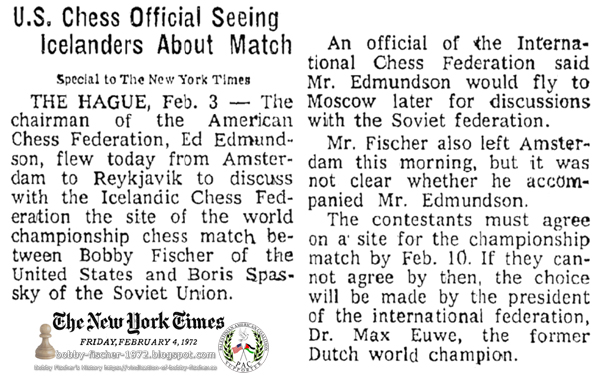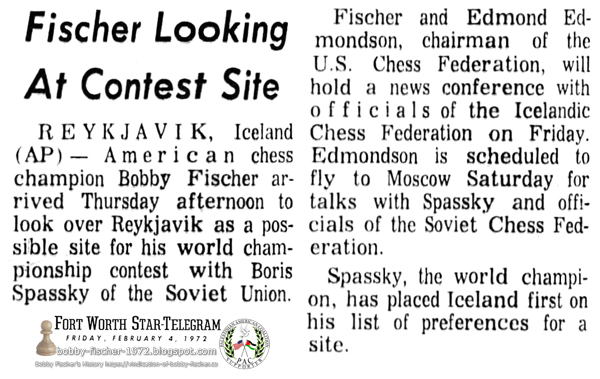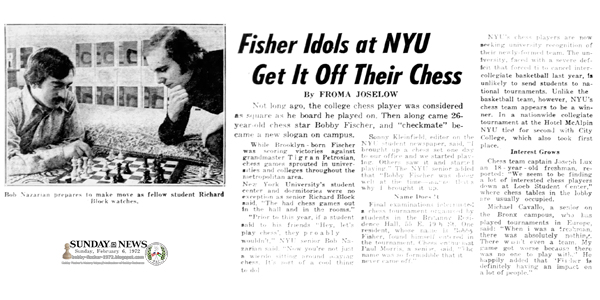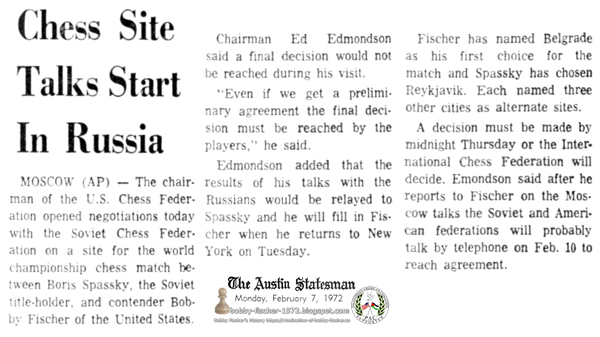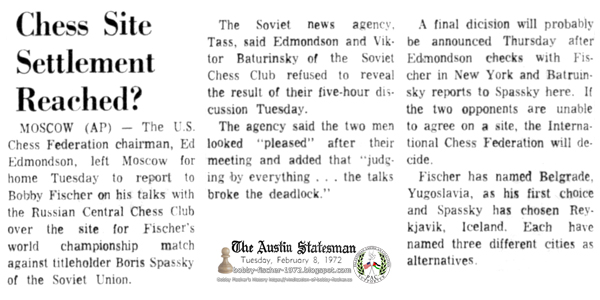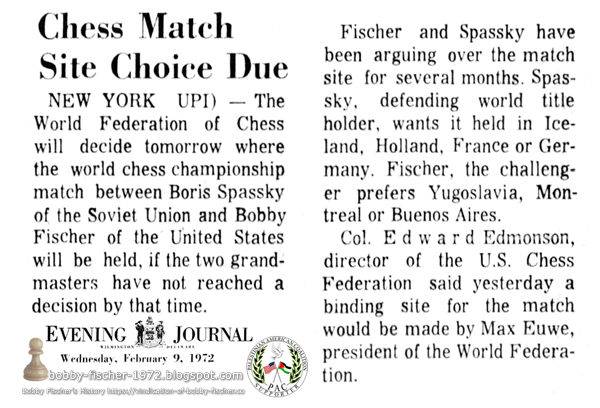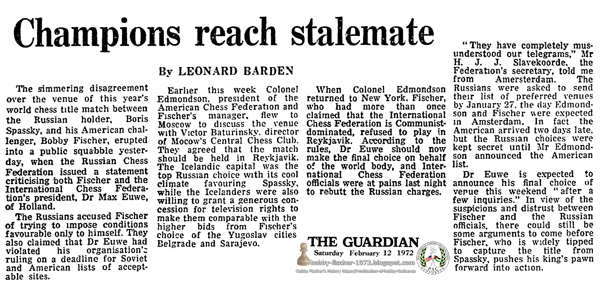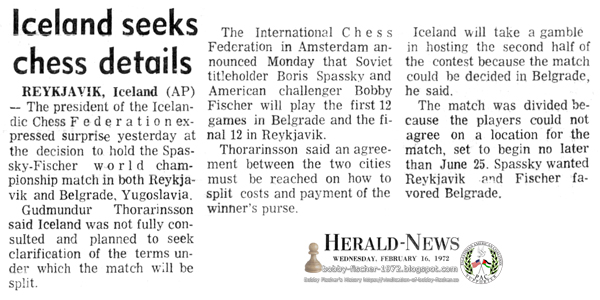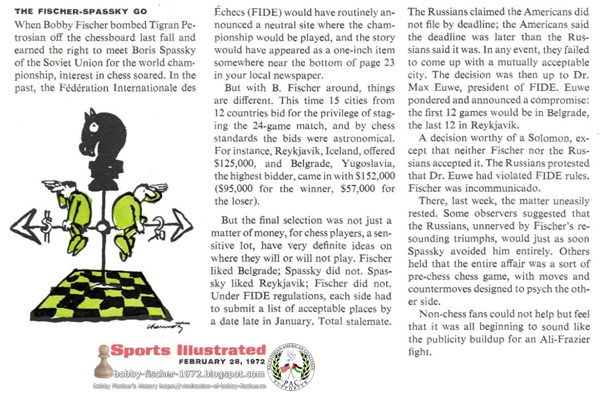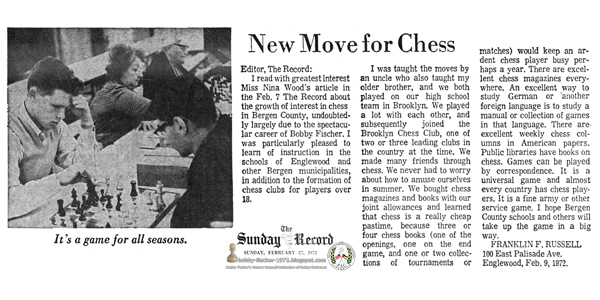The Boston Globe Boston, Massachusetts Tuesday, February 01, 1972 - Page 7
Site of World Chess Championships Still Undecided
Amsterdam (UPI) — Ed Edmondson, president of the United States Chess Federation, said today he will go to Moscow in a final effort to agree on a site for the chess match between world champion Boris Spassky and American challenger Bobby Fischer this year.
He said Fischer may accompany him.
Edmondson and Fischer offered their list of preferred sites to World Chess Federation president Max Euwe Monday to meet his Jan. 31 deadline. When Euwe checked it against the list he had received from Spassky he found no common sites.
Spassky's preferences included Iceland, Holland, West Germany and France, in that sequence. Fischer proposed Yugoslavia, Argentina or Canada.
Euwe said he agreed with Fischer that a city in Yugoslavia looked suitable because the nation was chess-minded and its bid topped those of 11 other countries. He said he decided to postpone the deadline until Feb. 10.
“If then, by midnight, there is no agreement between the two parties, I will decide for them,” Euwe said.
The winner will receive nearly two-thirds of the prize money offered by the city getting the final nod. The loser gets the rest.
Edmondson said Yugoslavia offered $152,000 for a match in Belgrade.
Fischer, who refused to discuss the situation with newsmen yesterday, was quoted earlier as saying money was his prime consideration in the choice of site.
Tampa Bay Times St. Petersburg, Florida Wednesday, February 02, 1972 - Page 39
Chess Site Due Feb. 10
Amsterdam (UPI) — Max Euwe, president of the World Chess Federation (FIDE), Monday announced he gave chess world champion Boris Spassky of the Soviet Union and challenger Bobby Fischer of the United States until Feb. 10 to agree on the site where they will have their world championships match later this year.
Euwe said he made the decision because the lists entered by the opponents as to their preference did not agree.
The Soviet list read in order of preference: Iceland, Holland, West Germany and France. The American list showed in sequence: Belgrade, Sarajevo, Buenos Aires and Canada.
Euwe said chances were good that Fischer's manager, Ed Edmondson, would fly to Moscow for direct talks with Soviet Chess Federation officials.
Edmondson said he feared the negotiations would be difficult. He said:
“It is my impression that the Russians made a political question out of this match. It is not clear to me why they definitely do not want to play in Yugoslavia. So it might turn out we would need more than a 10-day postponement. In that case Euwe should decide the site by himself on Feb. 11.”
The Daily Messenger Canandaigua, New York Wednesday, February 02, 1972 - Page 4
The Lighter Side: Tension Is Mounting Over Chess Tournament
WASHINGTON (UPI) —Although the event is still some six months away, excitement over next summer's world championship chess match already is reaching fever pitch.
According to the World Chess Federation, 10 countries and five cities have submitted record bids as high as $152,000 for the right to play host to the title duel between Boris Spassky of the Soviet Union and Bobby Fischer of the United States.
And that probably is only a drop in the bucket. There also is in prospect “vast gross income from television and film rights.”
Having never seen a televised chess match myself, I approached a network official and asked how he would go about covering the 24-game encounter.
Cosell Plus Analysts
“I would hire Howard Cosell to handle the move-by-move commentary,” he said, “and then I would sign up a team of analysts including Don Meredith, Bill Russell, Byron Nelson, Jack Kramer, Leonard Bernstein, Billy Graham, Bud Wilkinson, Elizabeth Taylor, Alfred M. Landon, Jack Anderson, Henry Kissinger, Lawrence Welk, Howard Hughes, David Eisenhower, Jimmy Hoffa and Billie Sol Estes.”
“Why so many?”
“When you are covering a match that may last more than two months, you need a lot of analyses to fill in the time between moves,” he explained.
In addition, he continued, many technical innovations would be employed to bring the home audience all of the suspense, tension and thrills experienced by spectators on the scene.
“We would arrange for a Goodyear blimp to hover over the chess board and provide interesting and unusual camera angles,” he said.
Mike-Equipped Players
“Each player would be equipped with a portable mike so the audience could hear them muttering to themselves as they mulled over their next moves.
“We also would assign a board level camera to isolate on Fischer, who is noted for his daring style of play, and we would have instant-replays of all the vital moves, such as checkmates and castlings.
“Moreover, part of the match would be presented on prime time, live and in color, possibly in the 9-to-11 slot on Monday evenings.”
“That sounds breathtaking,” I said, “but what would happen if neither player made a move during that period?”
“In that case,” he said, “we would spellbind the audience with a rerun of the 1956 Republican Convention.”
The News Journal Wilmington, Delaware Thursday, February 03, 1972 - Page 1
Fischer Hunts for Chess Site
Reykjavik, Iceland (AP) — American chess champion Bobby Fischer flew to Reykjavik today to discuss Iceland's bid to be the site of his world chess title contest with Soviet champion Boris Spassky.
Fischer was accompanied by Edmund Edmondson, chairman of the U.S. Chess Federation.
Iceland is Spassky's first choice, while Fischer favors Belgrade because it has offered the biggest purse, $152,000. Iceland's bid was $125,000, but it has since offered the contestants a share of the television and movie revenue, and this is believed to push the bid to $185,000.
The match is to start before July 1.
Fischer and Edmondson came from Amsterdam. Chess sources there said the latter would go next to Moscow and try to reach an agreement with Spassky. The International Chess Federation has given the two players until Feb. 10 to choose a city.
The Guardian London, Greater London, England Friday, February 04, 1972 - Page 5
Stalemate For Chess Championships by Leonard Barden
Boris Spassky, the Russian world chess champion, and his American challenger, Bobby Fischer, are still undecided on the venue for their match for the title in June after an international auction among 15 countries or cities who wanted to stage the 24-game encounter, scheduled to last two months.
Spassky wants the match to be held in Reykjavik, Amsterdam, Dortmund, or Paris, while Fischer's preferences are for Belgrade, Sarajevo, Buenos Aires, or Montreal. Ed Edmondson, president of the U.S. Chess Federation, flies to Moscow this week in a final effort to arrange a venue acceptable to both.
Mr. Edmondson's trip will be made against a background of hectic bidding among city governments all eager for the prestige of staging the match. When the first round of sealed bids was opened last month, the prize money offered by the 15 contenders totalled 1¼ million dollars, or four times Muhammad Ali's purse against Juggen Blin. Belgrade, which has been the venue of many major chess events, offered 152,000 dollars, the last 2,000 being a lucky intuitive idea which put the Yugoslavs ahead of Buenos Aires; 150,000 dollars. Reykjavik, Sarajevo, Chicago, Bled and Dortmund were the next highest bidders.
Dutch television broadcast the opening of the bids. The Icelandic dispatch was the heaviest, weighing four kilograms, with the financial offer accompanied by plans of Reykjavik and tourist information. Montreal sent a calligraphically lettered, bound volume to accentuate the solemnity of it all.
The top offer from Belgrade was cautiously enclosed with no fewer than five seals which gave the World Chess Federation's president, Max Euwe, a sticky time as he opened it before the cameras. The Belgrade backers sent their offer in near the end so as to keep their lead over the other Yugoslav contenders, Sarajevo, Bled and Zagreb.
The size of these offers surprised the chess world. Fischer, asked for his comments, said that they were “not bad” and “can do.” From Fischer, such words amount to almost ecstatic pleasure. After the official bidding closed, it was reported that Buenos Aires was considering a new offer of 200,000 dollars, while one of the leading Belgrade organizers flew to Moscow in a personal attempt to persuade Spassky to agree to Belgrade.
The latest disagreement reflects the different outlook of the two rivals. Spassky's preference for Reykjavik is climatic; it is the nearest he can get to the latitude of his native Leningrad. Sources close to the world champion say that he may have been influenced by an article which Petrosian wrote after his defeat by Fischer in Buenos Aires.
Petrosian claimed that shrewd choices of climate helped Fischer to defeat Mark Taimanov in Vancouver, Bent Larsen in Denver, and Petrosian himself in Argentina.
Mr. Euwe, on behalf of the World Chess Federation may have to make the final decision if the two contenders fail to agree in the next few days. In the meantime, Spassky, who on form will have a struggle to retain his title, is laying doggo while Fischer tours the possible playing venues. Spassky has several secret training matches scheduled for the next few months, and according to one Russian writer “every minute of his time has been already planned.”
Fischer and Spassky were expected to meet in Amsterdam this week to settle the venue and other match preliminaries. Journalists and television men turned up to watch the nearest thing on the chessboard to a big fight weigh-in. Fischer came, so did his manager, and so did Mr. Euwe, filling the role of referee.
What about Spassky? He had sent his opinions by letter. Were all the minutes too precisely planned, or can chess players detect a move by the professional psychologist who is one of Spassky's match advisers?
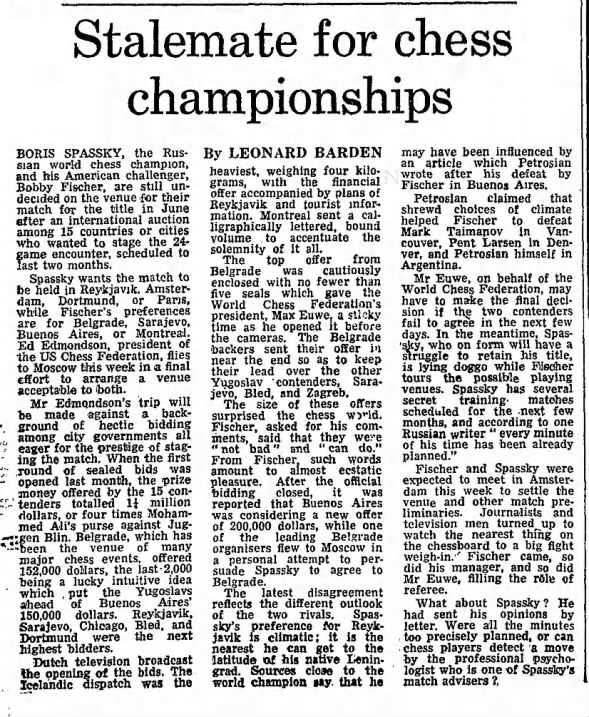 Stalemate For Chess Championships Fri, Feb 4, 1972 – 5 · The Guardian (London, Greater London, England) · Newspapers.com
Stalemate For Chess Championships Fri, Feb 4, 1972 – 5 · The Guardian (London, Greater London, England) · Newspapers.com
New York Times, New York, New York Friday, February 04, 1972 - Page 28
U.S. Chess Official Seeing Icelanders About Match
The Hague, Feb. 3 — The chairman of the American Chess Federation, Ed Edmondson, flew today from Amsterdam to Reykjavik to discuss with the Icelandic Chess Federation the site of the world championship chess match between Bobby Fischer of the United States and Boris Spassky of the Soviet Union.
An official of the International Chess Federation said Mr. Edmondson would fly to Moscow later for discussions with the Soviet federation.
Mr. Fischer also left Amsterdam this morning, but it was not clear whether he accompanied Mr. Edmondson.
The contestants must agree on a site for the championship match by Feb. 10. If they cannot agree by then, the choice will be made by the president of the international federation, Dr. Max Euwe, the former Dutch world champion.
Fort Worth Star-Telegram Fort Worth, Texas Friday, February 04, 1972 - Page 32
Fischer Look At Contest Site
Reykjavik, Iceland (AP) — American chess champion Bobby Fischer arrived Thursday afternoon to look over Reykjavik as a possible site for his world championship contest with Boris Spassky of the Soviet Union.
Fischer and Edmund Edmondson, chairman of the U.S. Chess Federation, will hope a news conference with officials of the Icelandic Chess Federation on Friday. Edmondson is scheduled to fly to Moscow Saturday for talks with Spassky and officials of the Soviet Chess Federation.
Spassky, the world champion, has placed Iceland first on his list of preferences for a site.
Daily News New York, New York Sunday, February 06, 1972 - Page 298
Fischer Idols at NYU Get It Off Their Chess by Froma Joselow
Not long ago, the college chess player was considered as square as the board he played on. Then along came 26-year-old chess star Bobby Fischer, and “checkmate” became a new slogan on campus.
While Brooklyn-bred Fischer was scoring victories against grandmaster Tigran Petrosian, chess games sprouted in universities and colleges throughout the metropolitan area.
New York University's student center and dormitories were no exception as senior Richard Block said, “They had chess games out in the hall and in the rooms.”
“Prior to this year, if a student said to his friends “Hey, let's play chess,’ they probably wouldn't,” NYU senior Bob Nazarian said. “Now you're not just a weirdo sitting around playing chess. It's sort of a cool thing to do.”
Sonny Kleinfeld, editor on the NYU student newspaper, said “I brought up a chess set one day to our office and we started playing. Others saw it and started playing.” The NYU senior added that “Bobby Fischer was doing well at the time—[illegible] that's why I brought it up.
Name Does It
Final examinations interrupted a chess tournament organized by students in the Britanny Residence Hall, 55 E. 10th St. One resident, whose name is Bobby Fisher, found himself entered in the tournament. Chess enthusiast Paul Morris, a senior, said, “The name was so formidable that it never came off.”
NYU's chess players are not seeking university recognition of their newly-formed team. The university, faced with a severe deficit that forced it to cancel inter-collegiate basketball last year, is unlikely to send students to national tournaments. Unlike the basketball team, however, NYU's chess team appears to be a winner. In a nationwide collegiate tournament at the Hotel McAlpin NYU tied for second with City College, which also took first place.
Interest Grows
Chess team captain Joseph Lux an 18-year-old freshman, reported: “We seem to be finding a lot of interested chess players down at Loeb Student Center,” where chess tables in the lobby are usually occupied.
Michael Cavallo, a senior on the Bronx campus, who has played tournaments in Europe, said: “When I was a freshman, there was absolutely nothing. There wasn't even a team. My game got worse because there was no one to play with.” He happily added that “Fischer is definitely having an impact on a lot of people.”
The Record Hackensack, New Jersey Monday, February 07, 1972 - Page 11
Chess Advancing in Bergen, Thanks to Fischer's Victories by Nina Wood
When a 28-year-old high school dropout can win a crack at the world chess championship, well then, this game of chess deserves another look.
The fame of Bobby Fischer, the first American to qualify for a try at the coveted title, has put a whole new perspective on the game of chess.
Schools in Bergen County are teaching students to play chess, and department stores report an increase in the sale of more expensive sets.
A salesman in the toys and games department of Bamberger's says he's noticed an increase in the sale of expensive chess sets—hand carved, silver-plated, and novelty designs.
A sales in the sporting department at Gimbels says sales of more elaborate chess sets have rise 25 per cent. He said the store also sells a large number of inexpensive sets for beginners.
Both men say people are probably buying expensive sets for ornament as well as practicality. They say the sets are often prominently displayed in homes.
Northern Valley Regional High School in Demarest began a course in chess for beginners Feb. 1.
Woodcliff Lake schools have a chess club for students in Grades 6 to 8 and, after school, students join with their teacher to learn the intricacies of the game.
At Quarles School in Englewood, 81-year-old Nathan Tenney, who learned to play chess in Russia when he was 5, teaches 9 to 10 year-olds the game two mornings a week, as part of a volunteer program.
The Englewood Recreation Department is trying to form a chess club for anyone 18 and over.
Two weekends ago, Closter had its first school tournament at the Village School, where children 11 to 13 meet once a week to play chess. Plans call for an annual tourney.
Gary Fischer, 13, was tournament champion and Scot LeBolt, also 13, was runnerup.
Glub advisor Alexander Katzman has great hopes for the future of chess in young people's hands. “We hope someday to have our own Bobby Fischer,” he says.
Katzman and Donald Mufson, a New York City school principal, also teach chess at the Saturday children's workshop in Closter's Hillside School.
About 18 children come to workshop and, Katzman says, adults are starting to come too.
Mrs. Robert Bowman of Ridgewood has two teen-age children and she says they learned how to play chess when they were in the third grade. She says their teacher taught them the basics and they've played chess ever since.
Youth is taking a growing interest in the game that will take Fischer to the world chess championship in April.
Several of the 26 men competing in the Bergen County Chess Tournament now under way in Dumont are under 21.
In fact, one of the prime contenders for the junior class trophy is 12-year-old Kenneth Regan of Paramus who came in second at last year's tournament. He plays contestants of all ages and skill and is among the top 25 chess players under 16 in the country.
Ken learned to play chess from his father six years ago. Now, he could probably beat his father on any given day.
The tournament games have been played on successive Wednesday nights in the Dumont High School cafeteria. This Wednesday will be the last of six weeks of competition and each week Ken's mother has been driving her son to the match and sitting in the background reading while the 12-year-old hovers over a chessboard.
As she sits diligently through the lengthy competitions she says she's very proud of her son. Ken is a patient chess player. His mother is a patient chauffeur.
Jules Platt of Paramus and Bernard Friend of Leonia lead in the finals, each with four wins and a tie. Next are Regan and Richard Engnath, who lives in New York but belongs to the Glen Rock Chess Club. Both have won four games.
Players vary from New Milford policeman William Havens to Ridgefield Park High School student Gregory Quimby, president of his chess club, to Teaneck piano tuner Ladislaus Rysey.
Rysey is from Czechoslovakia. Until two years ago, he couldn't find anyone to play chess with him in the States. Then he came to tune Harry Strickling's piano and noticed a chess set.
Stickling, president of the Dumont Chess Club and director of this year's tournament, invited Rysey to join the group.
Although he claims chess is only a game to him, Strickling, who teaches the chess course at Northern Valley Regional High School, refers to the time when he took a real interest in the game as when he came alive.
“I played when I was a little kid, but it never really came alive for me until eight years ago,” he says.
He maintains there are more chess players in Bergen County than can be accounted for in chess clubs and refers to incipient chess players—people who enjoy the game but can't find playing partners.
Strickling also says interest in chess had grown recently, probably because of Bobby Fischer's wide acclaim. “A lot more people are talking about it,” he says.
Despite the blossoming interest, Strickling says two misconceptions still exist about chess.
“One of them is that you have to be some kind of genius,” he says. “About all you have to do is be able to count to four.”
But, later he admits that only persons with a certain intellectual bent are seriously attracted to the game.
He says another misconception is that the game takes a long time to play. Chess can take from 10 minutes to three or four hours, Strickling says, adding that even the maximum is no longer than a night of playing bridge.
Most games take about an hour, he says, contrasting it with feverish board games that can go on for days.
A good chess player is competitive—sometimes fiercely so, likes puzzles, has a good memory, and is imaginative, Strickling says.
Some are reckless, others are patient. Most play the board, a few experts play their opponents, he says.
“It has to grab you,” Strickling says of the game. “It's all right there in front of you. That's the amazing thing about chess.”
The game combines an interplay of power, space, and time. Games are won or lost, because a player wastes moves getting his pieces into play.
An expert player can win a game by sacrificing some of his stronger pieces to put the remaining ones in better playing position.
The queen—the most powerful piece on the board—can be an intimidating force, yet it can be defeated by a lowly pawn in the right place.
No women are entered in the county chess tournament this year, and Strickling says only three of 60 members in the Dumont Chess Club are female.
He suggests that perhaps most women aren't competitive enough for the game.
Strickling thinks there is a growing interest in chess and, even if it's only from a bystander's viewpoint, he says he welcomes the new-found popularity.
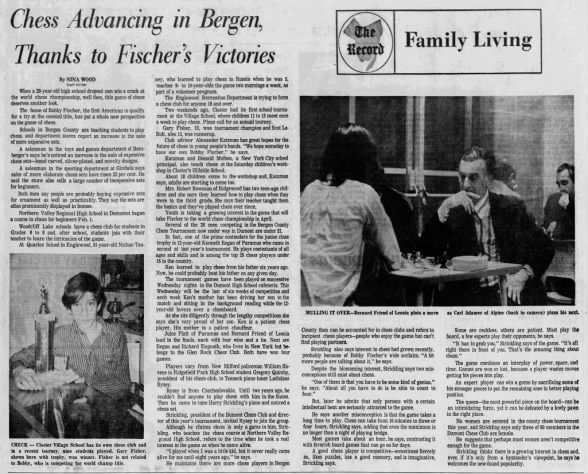 Chess Advancing in Bergen, Thanks to Fischer's Victories Mon, Feb 7, 1972 – 11 · The Record (Hackensack, New Jersey) · Newspapers.com
Chess Advancing in Bergen, Thanks to Fischer's Victories Mon, Feb 7, 1972 – 11 · The Record (Hackensack, New Jersey) · Newspapers.com
Austin American-Statesman Austin, Texas Monday, February 07, 1972 - Page 21
Chess Site Talks Start In Russia
Moscow (AP) — The chairman of the U.S. Chess Federation opened negotiations today with the Soviet Chess Federation on a site for the world championship chess match between Boris Spassky, the Soviet title-holder, and contender Bobby Fischer of the United States.
Chairman Ed Edmondson said a final decision would not be reached during his visit.
“Even if we get a preliminary agreement the final decision must be reached by the players,” he said.
Edmondson added that the results of his talks with the Russians would be relayed to Spassky and he will fill in Fischer when he returns to New York on Tuesday.
Fischer has named Belgrade as his first choice for the match and Spassky has chosen Reykjavik. Each named three other cities as alternate sites.
A decision must be made by midnight Thursday or the International Chess Federation will decide. Edmondson said after he reports to Fischer on the Moscow talks the Soviet and American federations will probably talk by telephone on Feb. 10 to reach agreement.
Austin American-Statesman Austin, Texas Tuesday, February 08, 1972 - Page 6
Chess Site Settlement Reached?
Moscow (AP) — The U.S. Chess Federation chairman, Ed Edmondson, left Moscow for home Tuesday to report to Bobby Fischer on his talks with the Russian Central Chess Club over the site for Fischer's world championship match against titleholder Boris Spassky of the Soviet Union.
The Soviet news agency, Tass, said Edmondson and Viktor Baturinsky of the Soviet Chess Club refused to reveal the result of their five-hour discussion Tuesday.
The agency said the two men looked “pleased” after their meeting and added that “judging by everything … the talks broke the deadlock.”
A final decision will probably be announced Thursday after Edmondson checks with Fischer in New York and Baturinsky reports to Spassky here. If the two opponents are unable to agree on a site, the International Chess Federation will decide.
Fischer has named Belgrade, Yugoslavia, as his first choice and Spassky has chosen Reykjavik, Iceland. Each have named three different cities as alternatives.
The Orlando Sentinel Orlando, Florida Wednesday, February 09, 1972 - Page 35
2 Cities Win Chess Match
New York Times, Moscow — The Soviet Union announced Tuesday that Russian and American chess officials had reached agreement on the site of the world championship match between Boris Spassky and Bobby Fischer, subject to approval by the two contenders.
The decision if accepted by Spassky, the Soviet titleholder, and Fischer, the American challenger, is to be made public Thursday after Dr. Max Euwe of the Netherlands, president of the World Chess Federation, has been officially informed.
TASS, the Soviet government press agency, indicated it would involve play in more than one site. There were indications that the compromise would include Belgrade or Buenos Aires, reputedly favored by Fischer, and Reykjavik, Iceland, the first choice of Spassky.
All three cities happen to have submitted the highest cash bids for the match, and Fischer has said that he tended to prefer the highest bidders. The Soviet press has criticized him for making the size of the purse a criterion in site selection.
According to Tass, agreement was reached Monday in a five-hour meeting between Col. Edmund Edmondson, executive director of the United States Chess Federation, and Viktor Baturinsky, secretary of the Soviet Chess Federation. A brief Tass dispatch Monday indicated that no final accord had been reached.
EDMONDSON arrived in Moscow by air late Sunday after having visited both Belgrade, which has offered the biggest prize money — $152,000, and Reykjavik, which submitted a $125,000 bid. Fischer accompanied the chess officials to both proposed sites, but no to Moscow.
The Soviet press agency said Edmondson would discuss the decision with the American challenger after returning to New York later Tuesday, while the Soviet side would confer with Spassky. In case of mutual consent, final agreement is to be affirmed by cablegrams.
Although Western newsmen could not learn details of the chess negotiations, and Edmondson could not be reached, the official Soviet press agency, by virtue of its position, was able to provide a detailed account of the discussion.
HINTING AT a compromise, the Tass dispatch said:
“Although Edmondson and Baturinsky refused to tell newsmen their preliminary decision, judging by everything, including their pleased looks, the talks broke the deadlock. Now everything depends on how the adopted plan will suit Spassky and Fischer.”
Buenos Aires, where Fischer defeated Tigran Petrosian of the Soviet Union in the final challenge round in the fall, has offered $150,000 for the championship match. The winner is to get 63.5 per cent and the loser 37.5 per cent.
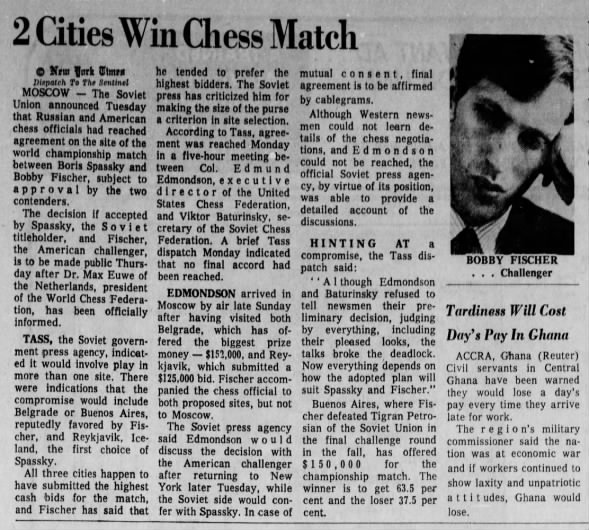 2 Cities Win Chess Match Wed, Feb 9, 1972 – Page 35 · The Orlando Sentinel (Orlando, Florida) · Newspapers.com
2 Cities Win Chess Match Wed, Feb 9, 1972 – Page 35 · The Orlando Sentinel (Orlando, Florida) · Newspapers.com
Asbury Park Press Asbury Park, New Jersey Wednesday, February 09, 1972 - Page 36
Chess Site Choice Near Time Limit
New York (AP) — The chairman of the U.S. Chess Federation, Ed Edmondson, said yesterday Bobby Fischer and Boris Spassky have until tomorrow to decide where they will play their match for the world chess championship.
If the American challenger and the Soviet holder of the championship do not decide by 8 a.m. EST, tomorrow, Edmondson said, Max Euwe, head of the International Chess Federation, will choose the site.
Euwe lives in the Netherlands, one of four places Spassky has listed as sites he considers suitable.
The others are Iceland, France and Dortmund, West Germany.
Fischer said he prefers a city in Yugoslavia, Buenos Aires, Argentina, or Montreal.
The American won the right to challenge Spassky by beating former world champion Tigran Petrosyan of the Soviet Union at Buenos Aires last year.
Edmondson returned yesterday from what he called “cordial discussions” of the problem with Viktor Baturinsky of the Soviet Chess Club in Moscow.
The News Journal Wilmington, Delaware Wednesday, February 09, 1972 - Page 20
Chess Match Site Choice Due
New York (UPI) — The World Federation of Chess will decide tomorrow where the world chess championship match between Boris Spassky of the Soviet Union and Bobby Fischer of the United States will be held, if the two grandmasters have not reached a decision by that time.
Fischer and Spassky have been arguing over the match site for several months. Spassky, defending world title holder, wants it held in Iceland, Holland, France or Germany. Fischer, the challenger, prefers Yugoslavia, Montreal or Buenos Aires.
Col. Edward Edmondson, director of the U.S. Chess Federation said yesterday a binding site for the match would be made by Max Euwe, president of the World Federation.
The Vancouver Sun Vancouver, British Columbia, Canada Wednesday, February 09, 1972 - Page 14
Chess Talks Deadlocked
New York — A stalemate has been reached in negotiations for the site of the world chess championship match between U.S. grandmaster Bobby Fischer and defending champion Boris Spassky of the Soviet Union.
Ed Edmondson, executive director of the U.S. Chess Federation, said today the players could not agree on the site, and the decision is now up to Dr. Max Euwe, president of the World Chess Federation (FIDE).
Euwe will choose the site Thursday. Several countries have bid for rights to host the 24-game match, but Edmondson said the choice has been narrowed to Reykjavik, Iceland and Belgrade, Yugoslavia.
Fischer prefers Belgrade which bid $152,000, while Spassky is reported to prefer Reykjavik, whose bid was $125,000. Another top bidder was Buenos Aires, which bid $150,000.
Edmonton denied reports out of Moscow by the New York Times and Tass news agency which said he and Soviet negotiator Victor Baturinsky had come to agreement on the site.
He said neither player has made meaningful concessions, thus throwing the decision into Euwe's lap, as provided by FIDE regulations.
The match is expected to begin in late June.
The Signal Santa Clarita, California Wednesday, February 09, 1972 - Page 1
Chess Comes To Valencia Valley: If You're Not a Grand Master Play Barefoot by Signal Staff Writer
For decades the Soviet Union has thoroughly dominated the world of chess.
It is quite far to say that chess in Russia is what drag racing is to Los Angeles county.
But, this year, a remarkable event will take place in Belgrade, Yugoslavia. A young American genius, Bobby Fischer by name, has challenged the Soviet's current world champion, Boris Spassky, to a series of matches to be played in April. Very possibly after the final critical game has been played the United States can claim the greatest of all living chess players in the world — if not of all time.
Thus the ancient, but seemingly eternal game of chess, is entering into a Renaissance in American. And without question it will become an important element in the cultural life of Valencia Valley.
And as its part in the attempt to turn the valley into at least the Paris of the chess world in the United States, the Signal has arranged to bring to its readers the magnificent column and game problems especially prepared by one of history's greatest International Chess Master, George Koltanowski. He is the world's champion blindfold player, a onetime Belgian diamond-cutter who, at the venerable age of 17 became the national champion of his country.
The Signal's new chess feature will be carefully prepared for both beginners and advanced players. There will be clear, concise explanations of the basic moves of the different chess men and most widely used openings and defenses. In addition Koltanowski will present sophisticated chess problems each Wednesday, with the solutions appearing in the following issue of Friday (so no one can cheat, at least through Thursday night.)
In the field of news coverage of the chess world, the Signal is prepared to bring its readers up-to-the-moment coverage of the historic Fischer-Spassky matches in Belgrade via wire service reports and special correspondents.
And in the area of special community events, the Signal right now is organizing a series of local matches wherein Koltanowski will play simultaneous and blindfold games against the best opponents Southern California has to offer.
But most of all, the Signal is endeavoring to introduce more and more chess into the homes of Valencia Valley, simply because the game is both a fascinating exercise of skill and logic and is just plain fun.
For centuries chess has often been equated with bearded sages, sitting motionless over the board, moving a piece of wood somewhere every hour or so. It is a game for people to enjoy — certainly more fascinating than the commercials on anyone's favorite TV soap opera. It is a game for the young as well as the old, for women as well as men, for the handicapped, the student and the occasional dabbler.
Koltanowski has often said: “Chess is really the only game worthy of man's talents. It is a peaceful battlefield of 64 squares peopled with opposing forces of pawns, knights, bishops, castles, and, of course the nobility.”
If anyone wants to capture a King these days, all he has to do is play a game of chess — and win it.
★
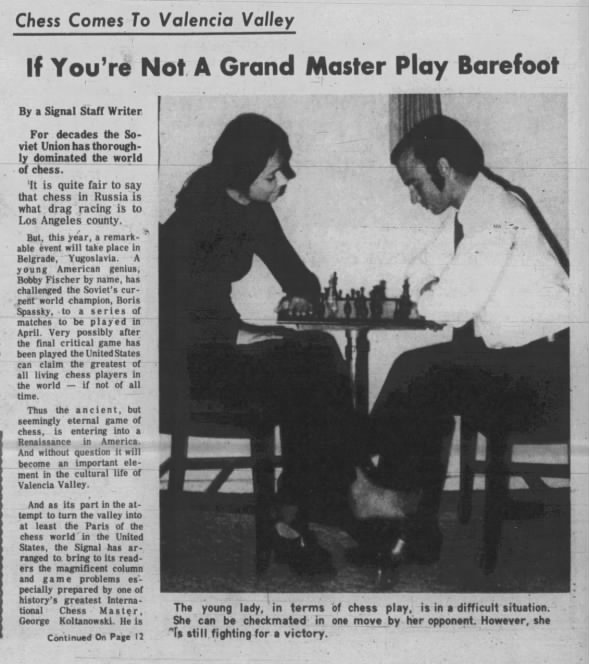 Chess Comes To Valencia Valley: If You're Not a Grand Master Play Barefoot Wed, Feb 9, 1972 – 1 · The Signal (Santa Clarita, California) · Newspapers.com
Chess Comes To Valencia Valley: If You're Not a Grand Master Play Barefoot Wed, Feb 9, 1972 – 1 · The Signal (Santa Clarita, California) · Newspapers.com
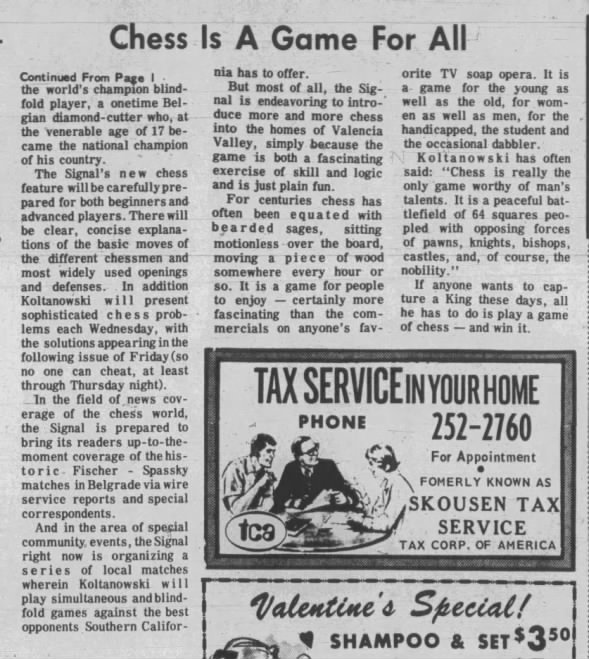 Chess Is A Game For All Wed, Feb 9, 1972 – 12 · The Signal (Santa Clarita, California) · Newspapers.com
Chess Is A Game For All Wed, Feb 9, 1972 – 12 · The Signal (Santa Clarita, California) · Newspapers.com
Chicago Tribune Chicago, Illinois Wednesday, February 09, 1972 - Page 44
Must Select Chess Site by Tomorrow
(Reuters) New York — THE TWO participants in the forthcoming international chess championship will have to choose the site for the matches by tomorrow or the International Chess Federation will designate a site, Col. Edmund Edmondson, executive director of the U.S. Chess Federation, said yesterday.
The match involves American Bobby Fischer and Boris Spassky of the Soviet Union. Representatives of the two players have been negotiating for a match site.
Edmondson said, “If they don't agree on a site by 2 p.m. [6 a.m. EST] Feb. 10, Amsterdam time, the selection will be made by Max Euwe, president of the International Chess Federation. His decision will be binding. There will be no appeal.”
Edmondson said he would keep in constant touch with the situation during the next 48 hours as to whether the two players could reach a decision.
The Soviet champion's selections were Iceland, Holland, France, or Dortmund, Germany. America's entry was for one of two Yugoslav cities or Buenos Aires or Montreal.
The American Chess Federation executive made his remarks after returning from a trip to Yugoslavia, Holland, Iceland and Denmark, as well as the Soviet Union.
Journal and Courier Lafayette, Indiana Friday, February 11, 1972 - Page 12
Soviet Chess Group Accuses Fischer
Moscow (UPI) — The Soviet Chess Federation today accused Bobby Fischer and President Max Euwe of the World Chess Federation of misconduct in negotiations to set a place and date for the world championship chess match.
The Soviets said they might, in protest, reject Euwe's choice of a site and date for the match between Fischer and world champion Boris Spassky of Russia.
The Soviet federation called a news conference to comment on Fischer's rejection of a site —Reykjavik, Iceland — agreed upon in secret Moscow negotiations Feb. 7 between Soviet officials and Edmund B. Edmondson, executive director of the U.S. Chess Federation.
They said Euwe had broken his own world federation rules in favor of Fischer by extending the deadline for submitting preferences on site and date when Fischer failed to observe it.
After the Americans had submitted Fischer's list of preferred cities late, they said, Euwe extended the deadline another 10 days in hopes Fischer and Spassky could negotiate an agreement. None of the choices on their lists tallied.
“According to the standing procedure established by Euwe and the world federation, the Soviet side presented its documents and proposals in time, whereas the American side did not,” the Soviet federation said.
“The Soviet federation lodges an official protest against the breaching of regulations and procedures established by the World Chess Federation, demands strict fulfillment of the federation's decisions and rejects attempts on the part of the challenger (Fischer) to impose match conditions suitable only for him,” a statement said.
In response to questions by newsmen, Viktor Dr. Baturinsky, vice president of the Soviet Chess Federation, said the Russians might reject Euwe's attempt to break the stalemate.
“We think the president (Euwe) is not acting in accord with the procedures established by himself and naturally we reserve the right to make our own decision on whatever site he proposes,” Baturinsky said.
Euwe had announced he would make the choice himself if the Soviets and Americans could not reach agreement.
The Soviet officials disclosed the details of Edmondson's visit and the confidential agreement rejected by Fischer because, “We believe it is time to make the course of the negotiations public so public opinion can get the correct impression.”
The Soviets said Edmondson had signed a provisional agreement Feb. 7 to hold the match in Reykjavik in June 25 for a purse of $125,000. The winner was to get 62.5 per cent of the purse and the loser 37.5 per cent.
“At Edmondson' request, this agreement was to be made public after Feb. 10, pending approval from both contestants,” the statement said.
It then said Spassky approved the agreement and Fischer rejected it.
The statement said Spassky wanted to play “in a European country with a moderate climate,” and had submitted four choices, including Reykjavik.
“Soviet chess players have in the past taken into account Fischer's religious and other customs and habits, even though that sometimes led the breach of accustomed rhythms,” it said.
“That is why we hoped the American side and the world federation this time would show consideration for the wishes of the champion.”
The Lowell Sun Lowell, Massachusetts Friday, February 11, 1972 - Page 34
Soviets Blame U.S. and FIDE in Chess Site Stalemate
Moscow (AP) — The Soviet Chess Federation charged today that the U.S. and International Chess Federations were responsible for the impasse in the choice of the site for the Spassky-Fischer world championship match.
Dmitry V. Postnikov, the Soviet federation's president, told a news conference that the Russians had made an official protest, charging “nonobservance of the International Chess Federation's regulations and procedures.”
Postnikov added that the Soviet side may not consider itself bound by a FIDE decision on the site match if, in their view, FIDE rules are further violated. FIDE stands for the International Chess Federation.
Boris Spassky of the Soviet Union, the current champion, and Bobby Fischer of the United States, the challenger, were unable to agree on a site for their match by the Feb. 10 deadline established by FIDE president Dr. Max Euwe.
According to the international federation's rules, Euwe will now make the final decision on the match site.
The Soviet protest, sent Thursday to FIDE headquarters in Amsterdam, “demands strict observance of FIDE decisions and rejects the attempts by the challenger to force conditions for the championship match favorable only to him.”
[ ! …and vis versa!]
Postnikov announced following talks here between the Soviet Chess Federation and Ed Edmondson of the U.S. chess federation earlier this week, “a preliminary agreement” had been reached naming the Icelandic capital of Reykjavik as the match site.
But before a final decision was made, he said, both Spassky and Fischer had to give their approval.
Postkinov said Spassky had agreed but Fischer informed them Thursday he would not accept the Icelandic site.
Reykjavik was Spassky's first choice for the match site, while Fischer's was Belgrade, Yugoslavia.
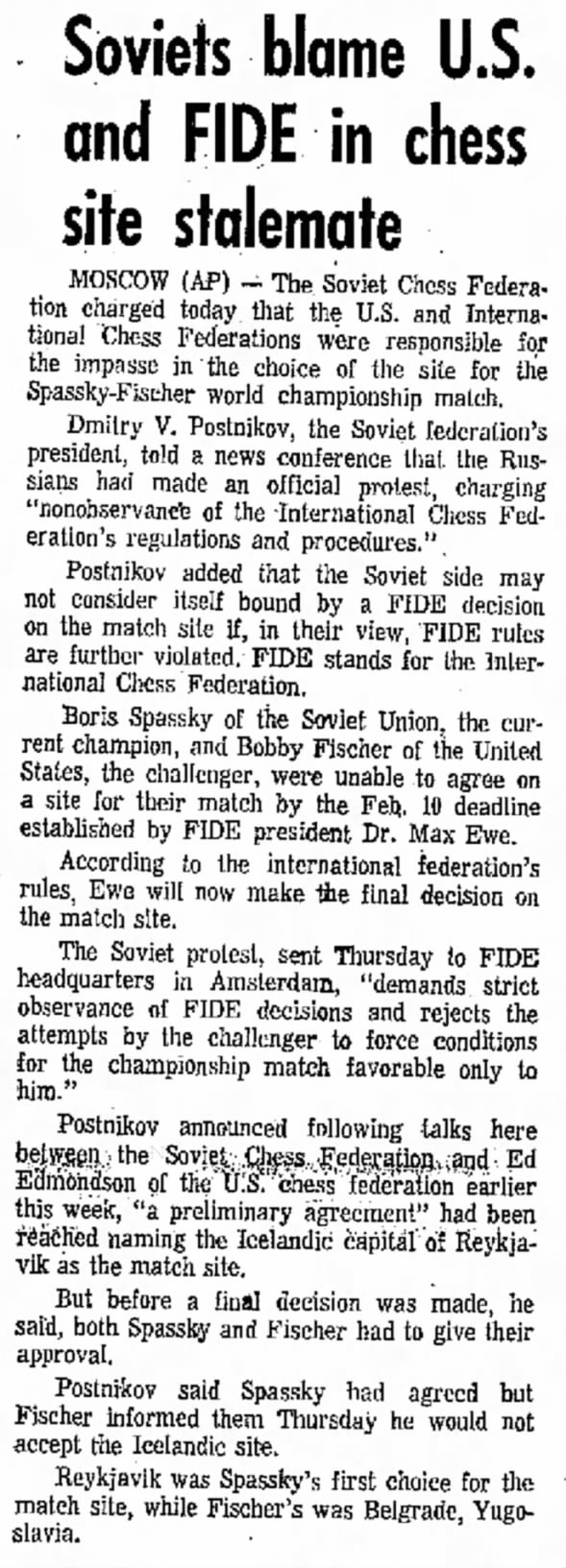 Soviets Blame U.S. and FIDE in Chess Site Stalemate Fri, Feb 11, 1972 – Page 34 · The Lowell Sun (Lowell, Massachusetts) · Newspapers.com
Soviets Blame U.S. and FIDE in Chess Site Stalemate Fri, Feb 11, 1972 – Page 34 · The Lowell Sun (Lowell, Massachusetts) · Newspapers.com
The Tennessean Nashville, Tennessee Friday, February 11, 1972 - Page 9
Chess Tourney Site Up In Air
Amsterdam (UPI) — World Chess Champion Boris Spassky of the Soviet Union and challenger Bobby Fischer of the United States have failed to meet the deadline for agreement on a location for the world championships, World Chess Federation President Max Euwe said yesterday.
The original deadline set by the federation was Jan. 31 but Euwe extended it until yesterday hoping the parties could agree.
By Jan. 31 the opponents had filed divergent preference lists. Fischer proposed two sites in Yugoslavia, Montreal or Buenos Aires. Spassky preferred Iceland, Holland, France or Germany.
After the deadline was extended by 10 days, Col. Ed Edmondson, executive director of the U.S. Federation, went to Moscow to discuss the situation with Soviet chess officials.
“I have just discussed the situation by telephone with Edmondson, who is back in New York, and it appears we are in serious trouble. In any case it will not be possible to announce the venue today,” Euwe said.
The Morning News Wilmington, Delaware Friday, February 11, 1972 - Page 3
Chess Masters Still Deliberate
Amsterdam (UPI) — World Chess champion Boris Spassky of the Soviet Union and Challenger Bobby Fischer of the United States have failed to meet the deadline for agreement on a location for the world championships, World Chess Federation president Max Euwe said yesterday. The original deadline set by the federation was Jan. 31 but Euwe extended it until yesterday hoping the parties could agree. By Jan. 31 the opponents had filed divergent preference lists. Euwe said he still was studying “some possibilities” and would announce his decision on where the match will be played within the next few days. He said the match would probably start “around July 25.”
The Lincoln Star Lincoln, Nebraska Saturday, February 12, 1972 - Page 5 ★
Youth In Action: Chess Club Members Find Excitement In Competition by Milan Wall, Star Staff Writer
Leaders of an East High School club who admit they are members of an “ignored minority” still exhibit as much enthusiasm about their extra-curricular activity as their sports-minded counterparts.
“We spend more time (at practice) than any football players,” said Roger Holmstedt, vice president of the East High chess club.
“It's important to us,” added Mike Mathews, club president, “although most don't realize it.”
Won Championship
The two chess enthusiasts do boast, however, that chess players won the five-year-old school's first state title in 1970 by capturing the Nebraska high school championship chess crown.
And they say, thanks to Bobby Fischer, chess is emerging from its low profile to gain some popularity nationally. Fischer is the young American who has been lauded as a chance at the world crown.
The East High students says most of their peers “run away cackling wildly” when they're told about the chess club.
But the two noted that East High students will soon be able to earn school letters in chess.
That, they say, doesn't set well with the more sports-minded high schoolers of today.
Mistaken Notion
“Sports fans think the only thing” worthy of a letter is “when you're risking your life,” noted Mike.
Mike, a 17-year-old senior, and Roger a junior at 16, both start each school day with chess—the members of the club grab an open room at East each morning at 8 a.m. and play til classes start 45 minutes later.
The youths both say they've been playing chess “seriously” for about three years, and both are now members of the U.S. Chess Federation.
Nationally Rated
Those membership give them nationally recognized ratings and put them into contests that could, with luck and a barrel full of skill, put one of them or others like them into a national championship some day.
The chess “season” lasts virtually all school year — the four Lincoln public high schools hold matches throughout the nine months of school.
The two are also currently playing in the city tournament, will enter the state high school tournament on Feb. 26 and are planning an Omaha-Lincoln match for early March.
“I like to think we have friendly competition,” said Mike.
“Nobody plans for blood,” he said.
But he added: “We do have the normal school spirit.”
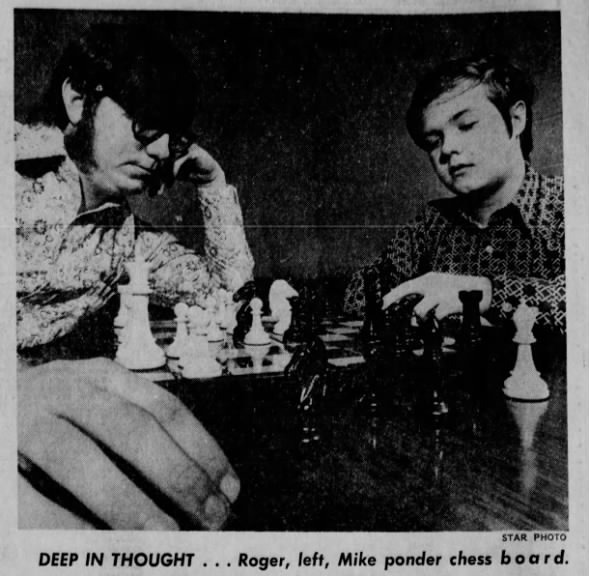 Deep In Thought Sat, Feb 12, 1972 – Page 5 · The Lincoln Star (Lincoln, Nebraska) · Newspapers.com
Deep In Thought Sat, Feb 12, 1972 – Page 5 · The Lincoln Star (Lincoln, Nebraska) · Newspapers.com
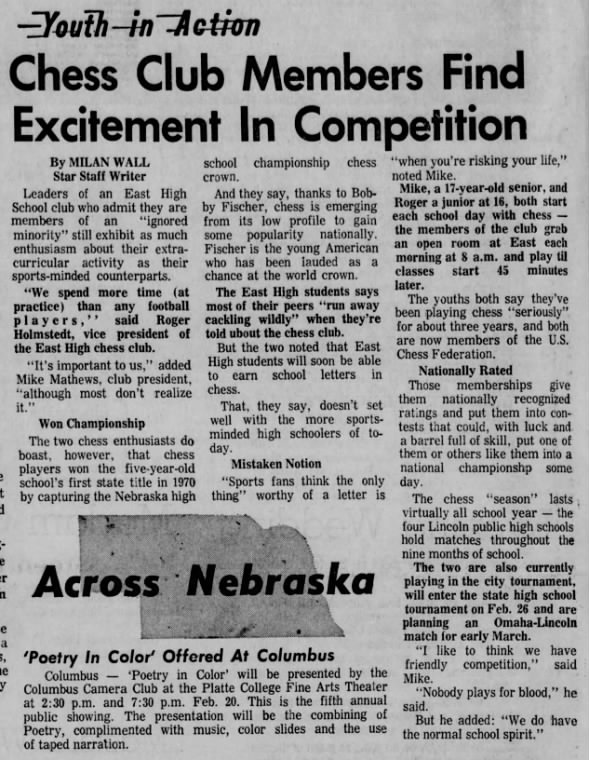 Youth in Action: Chess Club Members Find Excitement in Competition Sat, Feb 12, 1972 – Page 5 · The Lincoln Star (Lincoln, Nebraska) · Newspapers.com
Youth in Action: Chess Club Members Find Excitement in Competition Sat, Feb 12, 1972 – Page 5 · The Lincoln Star (Lincoln, Nebraska) · Newspapers.com
The Guardian London, Greater London, England Saturday, February 12, 1972 - Page 2
Champions Reach Stalemate by Leonard Barden
The simmering disagreement over the venue of this year's world chess title match between the Russian holder, Boris Spassky, and his American challenger, Bobby Fischer, erupted into a public squabble yesterday, when the Russian Chess Federation issued a statement criticising both Fischer and the International Chess Federation's president, Dr. Max Euwe, of Holland.
The Russians accused Fischer of trying to impose conditions favorable only to himself. They also claimed that Dr. Euwe had violated his organization's ruling on a deadline for Soviet and American lists of acceptable sites.
Earlier this week Colonel Edmondson, president of the American Chess Federation and Fischer's manager, flew to Moscow to discuss the venue with Victor Baturinsky, director of Moscow's Central Chess Club. They agreed that the match should be held in Reykjavik. The Icelandic capital was the top Russian choice with its cool climate favoring Spassky, while the Icelanders were also willing to grant a generous concession for television rights to make them comparable with the higher bids from Fischer's choice of the Yugoslav cities Belgrade and Sarajevo.
When Colonel Edmondson returned to New York, Fischer, who had more than once claimed that the International Chess Federation is Communist-dominated, refused to play in Reykjavik. According to the rules, Dr. Euwe should now make the final choice on behalf of the world body, and International Chess Federation officials were at pains last night to rebut the Russian charges.
“They have completely misunderstood our telegrams,” Mr. H.J.J. Slavekoorde, the Federation's secretary, told me from Amsterdam. The Russians were asked to send their list of preferred venues by January 27, the day Edmondson and Fischer were expected in Amsterdam. In fact the American arrived two days late, but the Russian choices were kept secret until Mr. Edmondson announced the American list.
Dr. Euwe is expected to announced his final choice of venue this weekend “after a few inquiries.” In view of the suspicions and distrust between Fischer and the Russian officials, there could still be some arguments to come before Fischer, who is widely tipped to capture the title from Spassky, pushes his king's pawn forward into action.
The Los Angeles Times Los Angeles, California Saturday, February 12, 1972 - Page 12
Chess World Hit by Flap on Match Site by Murray Seeger, Times Staff Writer
Moscow — It appears that Americans and Russians can negotiate such things as agreements on health research (signed Friday), rights for Berlin and perhaps even a limit on strategic arms development.
But chess? Nyet. Or at least not yet.
Five leading members of the important and large Chess Federation of the Soviet Union called a press conference Friday to charge that agreements negotiated with both the International Chess Federation and the U.S. Chess Federation over the site for the world chess championship match had been violated.
The Soviet chess experts were upset because they had just learned that the American challenger for the world title, Robert (Bobby) Fischer had rejected Reykjavik, Iceland, as the site and June 25 as the date for the match.
Russian Agrees
Both these details had been agreed to by Boris Spassky of Russia, the long-time reigning champion.
The Icelandic city had been agreed to also as the location in talks here Wednesday between Viktor Baturinsky, director of the prestigious Central Chess Club, and Col. Edmund Edmondson, director of the U.S. Chess Federation.
It was one of the four cities nominated for the match by Spassky who insists the play be held in the “moderate climate zone” like his native city of Leningrad. His other proposed sites were Dortmund, Germany; Amsterdam and Paris.
Fischer suggested five cities—Belgrade or Sarajevo, Yugoslavia; Chicago, Montreal or Buenos Airs.
Perspiring heavily under the light of a movie camera and a huge heater in the old, blue chess club, Baturinsky said “the situation is very complicated and it is difficult to see all that could happen.”
The Soviet chess leaders believed that the president of the International Chess Federation, Dr. Max Euwe of the Netherlands, would set the final site Thursday for the long-awaited match and that neither of the temperamental chess champions could veto it.
The private talks here this week also convinced the Russians that Fischer had agreed to the Icelandic locale.
Prerogative Cited
The Russians made clear that they felt Spassky, as the champion of the world, had some superior rights to selecting the conditions for defending his title over Fischer, the challenger.
“It is worth reminding that three matches of claimants between European chess players and Fischer were held in the Western Hemisphere in places mostly favorable for the American grand master,” the Russian federation said in a statement.
“The Soviet chess players respected the religious and other customs of Fischer though it sometimes violated the rhythm and order of the game habitual to them.”
Climate vs. Cash
The Russians claimed that Spassky asked only for a moderate climate to play in while Fischer was interested in the city that offered the highest cash prize. Belgrade made the best bid—$152,000.
Spassky did not accept Yugoslavia, Baturinsky said, because “in July and August it is hot in Belgrade.”
The international federation has declared that the world championship must be played by July 1. Apparently, new negotiations on a playing site will have to begin.
Chicago Tribune Chicago, Illinois Saturday, February 12, 1972 - Page 60
Fischer Reneged on Iceland Tourney, Soviet Chess United Says by James Yuenger, Chief of Moscow Bureau
Moscow, Feb. 11 — The Soviet Chess Federation today accused American Bobby Fischer of reneging on an agreement to play Boris Spassky of the U.S.S.R. for the World Chess Championship beginning June 25 in Reykjavik, Iceland.
It was the first disclosure that Reykjavik, with an offer of $125,000, had won the spirited bidding to sponsor the match. It still is uncertain whether Fischer and Spassky will, in fact, player there.
Spassky, current world champion, had listed Reykjavik as one of four cities acceptable to him. Others were Amsterdam, Paris and Dortmund, Germany. He specified that he wanted to play in a moderate climate.
Fischer had proposed Chicago, Buenos Aires, Montreal, and Belgrade and Sarajevo, Yugoslavia. The Russians claimed among other things that Chicago's $100,000 bid had missed the deadline set by the International Chess Federation. In an official protest, the Russians also charge that Max Euwe, head of the international federation, had permitted the American challenger to violate rules established for arranging the match.
They complained that Fischer proposed his list of acceptable sites on Jan. 31, four days after the deadline set by Euwe. But that Euwe let the violation pass.
In a press conference at Moscow's Central Chess Club, the Russians said that Col. E.B. Edmondson, president of the United States Chess Federation, signed a preliminary agreement here last Monday on the date and site of the match. They circulated copies of that agreement today.
They assumed Edmondson was Fischer's fully authorized agent because he had come here directly from Reykjavik, where he had seen Fischer.
The Russians said they learned yesterday in a wire from Edmondson that Fischer had rejected the agreement.
In careful diplomatic language, the Russians indicated that they were fed up with Fischer, whose temperament is legendary. He has already been given many concessions in preliminary challenge matches, they said.
“Soviet chess players took Robert Fischer's religion [he is not Jewish, nor is he a Seventh Day Adventist] and other habits into account,” [(but not account enough for the Soviets to have abstained from their decades-long historical acts of antisemitic discrimination against Reshevsky and Fischer, deeply rooted in the ideology underlying USSR politics.)] the U.S.S.R. protest said, “although sometimes it led to disruption of the rhythm and schedule of games to which they were accustomed.”
They said tradition accords the reigning champion preference in selecting the site of a major match, and they criticized Fischer for having said publicly that he wants to play where the money is best.
Belgrade made the biggest bid of $152,000 for the match, but Spassky said he didn't want to play there because it would be too hot in summer.
The agreement signed here last Monday stipulates that the winner will receive 62.5 per cent and the loser 37.5 per cent of the $125,000 that Reykjavik put up. The two players also would split 60 per cent of the subsequent television and movie revenues from the match, with the winner getting three-quarters of that sum. If they draw, this would be split 50-50.
“The U.S.S.R. Chess Federation thinks the time has come to bring to light the course of the talks about the world championship so the public gets a correct view,” the protest said.
But Russian officials said there had been no talk of either side “vetoing” any one of the 14 cities seeking the match.
The Baltimore Sun Baltimore, Maryland Saturday, February 12, 1972 - Page 1
Stubborn Fischer Vexes Russians by Dean Mills, Moscow Bureau of The Sun
Moscow—The Soviet-American battle for the chess championship of the world is months away, but the Russians began fighting yesterday, charging both the Americans and the International Chess Federation with foul play in the selection of a site for the match.
Soviet chess officials demanded that the international body choose the location from among the four choices submitted by the world champion, Boris Spassky of Russia. His choices were Reykjavik, Iceland, Amsterdam; Paris or Dortmund, West Germany.
They argued that the American challenger, Bobby Fischer, had lost his right to a say in the matter by failing to submit his list of choices until four days after the January 27 deadline agreed upon by both sides.
But it apparently was another action by Mr. Fischer that particularly angered the Russians and promoted them to reveal the details of the hitherto secret negotiations yesterday.
[(Neither Fischer nor Spassky are present during this conference between Edmondson and Soviet delegates, to agree to anything. Why was Spassky forbidden to attend the conference in Amsterdam where he could have made a binding agreement with Fischer, in person.)]
The Russians disclosed at a press conference that they had reached a “preliminary agreement” February 7 with Edmund B. Edmondson, the head of the American Chess Federation, to hold the match in Reykjavik beginning June 25.
But the announcement was to be held until both players approved the decision. Since Mr. Edmondson had come directly from Iceland, where Mr. Fischer was staying, the Russians indicated, they assumed this step would be only a formality.
Then, Wednesday, they were informed by telephone that Mr. Fischer had rejected both the proposed time and place.
In the statement released by the Soviet officials, they said they thought the time had come to make public the details of the negotiations “so the public could get a correct understanding of the situation which has been created.”
Declaring “an official protest against the breaking of regulations,” the Russians demanded that the international federation “reject the attempts of the challenger to arrange conditions pleasing only to him.”
The Russians revealed that Mr. Fischer named five cities on his list—Belgrade and Sarajevo, Yugoslavia; Chicago; Buenos Aires, and Montreal.
Only the Yugoslav locations satisfy the condition set by Mr. Spassky that the match be in a European country. And they do not meet the Russian's preference for a “moderate” climate.
“The fact that the champion did not mention a Yugoslav town,” the director of the Central Chess Club said, “can be explained, we assume, by climatic conditions. July and August are hot months there.”
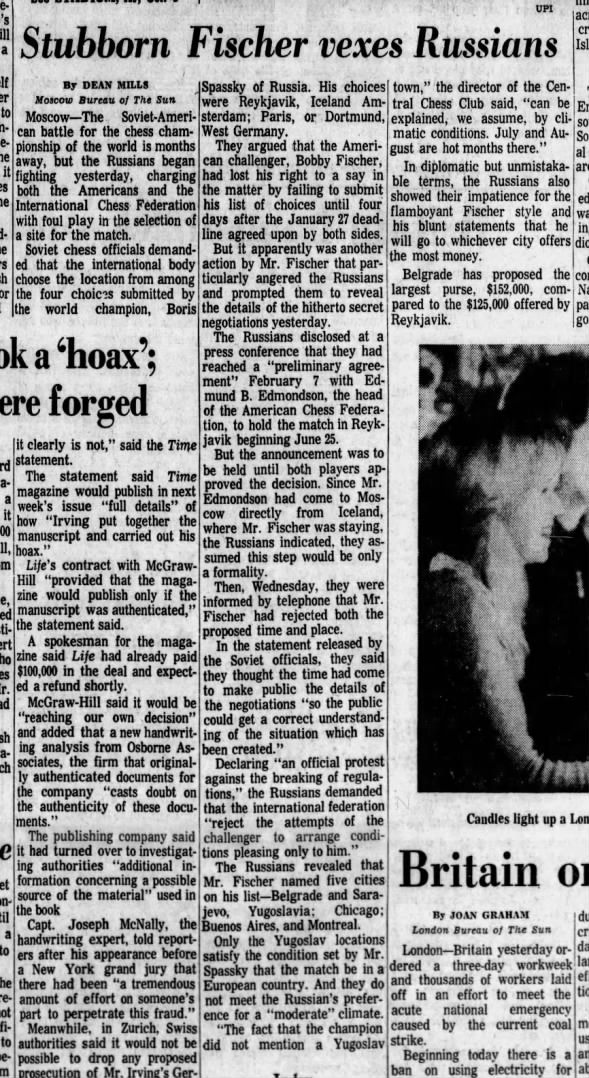 Stubborn Fischer Vexes Russians Sat, Feb 12, 1972 – 1 · The Baltimore Sun (Baltimore, Maryland) · Newspapers.com
Stubborn Fischer Vexes Russians Sat, Feb 12, 1972 – 1 · The Baltimore Sun (Baltimore, Maryland) · Newspapers.com
The Sydney Morning Herald Sydney, New South Wales, Australia Sunday, February 13, 1972 - Page 25
Chess Title Wrangle
Moscow, Saturday.—The Soviet Chess Federation today criticized American Grandmaster Bobby Fischer and the World Chess Federation.
It accused Fischer of trying to impose conditions favourable to himself for his world title match against Soviet champion Boris Spassky.
It also protested to the federation at its handling of the choice of venue.
It said Fischer had rejected a proposal that he meet Spassky in Reykjavik, despite an agreement signed two days earlier by a U.S. Chess Federation representative, Colonel Edmund Edmondson.
The Dutch president of the World Federation, Dr. Max Euwe, was accused of violating his organization's ruling on a deadline for Soviet and American lists of acceptable sites.
The Russians said Spassky wanted the final played in a European country with a mild climate, but Fischer had named only one European country—Yugoslavia—which Spassky is known to consider too hot.
The Belgrade Chess Association is reported to have offered $128,500 in prize money to have the match there.
Sarajevo bid $96,500.
The first game is expected to be played about July 25.
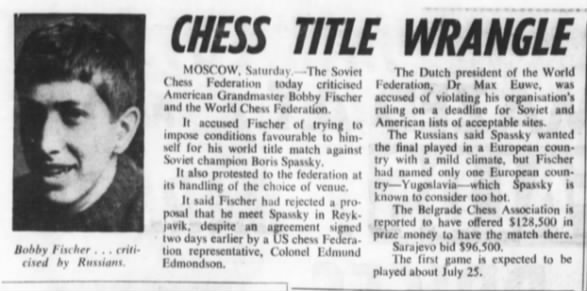 Chess Title Wrangle Sun, Feb 13, 1972 – Page 25 · The Sydney Morning Herald (Sydney, New South Wales, Australia) · Newspapers.com
Chess Title Wrangle Sun, Feb 13, 1972 – Page 25 · The Sydney Morning Herald (Sydney, New South Wales, Australia) · Newspapers.com
The Dispatch Moline, Illinois Monday, February 14, 1972 - Page 12
Chess Match Site To Be Announced
Amsterdam (UPI) — The final decision on the site and date for the world chess championship title match will be announced Tuesday by Max Euwe, president of the International Chess Federation, he said today.
Euwe refused to specify whether the final decision on the site was the result of an agreement between American challenger Bobby Fischer and Soviet title holder Boris Spassky.
Euwe said last week if the two could not compromise on a site, he would make the final decision himself.
New York Times, New York, New York Tuesday, February 15, 1972 - Page 30
Two Sites Chosen For Title Chess
Fischer Will Oppose Spassky in Belgrade and Reykjavik
Dr. Max Euwe of the Netherlands, president of the International Chess Federation, announced yesterday that the world championship match in which Bobby Fischer of the United States will oppose the defending champion, Boris Spassky of the Soviet Union, would be played partly in Belgrade, Yugoslavia, and partly in Reykjavik, Iceland.
According to his ruling, announced in Amsterdam, play would start in Belgrade not later than June 25 and would shift to Iceland after the first 12 games of the 24-game match.
Fischer refused to comment last night on Dr. Euwe's ruling, which was made after the sides each had designated four favored match sites without finding common ground.
Belgrade, Fischer's first choice, made the highest bid for the match, $152,000, to be divided five-eighths to the winner and three-eights to the loser. Reykjavik, Spassky's first choice, bid $125,000, and the total at stake will therefore be a midway figure, $138,500.
Spassky's choices seemed directed to obtaining climatic conditions comparable to his native Leningrad, and his alternative choices were in the Netherlands, France and Germany. Fischer's other selections were Montreal, Buenos Aires and another Yugoslav city, Sarajevo.
The conditions originally laid down provided for one veto by each side of Dr. Euwe's ruling. However, the Soviet officials did not submit a full list of 15 match sites in order. They said instead that all but their nominated four sites were unacceptable.
In the opinion of Dr. Euwe this was an exercise of the Soviet veto and no further veto power would be permitted. However, the Russians implied in a press release last week that they might not accept the World Chess Federation decision.
The Evening Sun, Baltimore, Maryland, Tuesday, February 15, 1972 - Page 4
Iceland, Yugoslavia Chess Match Sites
Amsterdam (AP)—Bobby Fischer and Boris Spassky will decide the world chess championship in a 24-game match divided between Reykjavik, Iceland and Belgrade, Yugoslavia.
Professor Max Euwe, president of the International Chess Federation, made the announcement Monday. Euwe said they made the decision on the locations because the players could not agree on a site.
The first 12 games between the American challenger and the Soviet titleholder will be played in Belgrade beginning no later than June 25. The final 12 will be played in Reykjavik.
Fischer preferred Belgrade and Spassky wanted Reykjavik.
Belgrade made the top offer of $152,000 to stage the match.
Organizers there said they expect to put up half the amount. However they added that they plan to contact Reykjavik as soon as possible to work out the issue.
Tampa Bay Times St. Petersburg, Florida Tuesday, February 15, 1972 - Page 29
Chess: A Tale of Two Cities
Amsterdam (UPI) — Max Euwe, president of the World Chess Federation, announced Monday the world title match between Russia's Boris Spassky and the United States' Bobby Fischer will be held both in Belgrade, Yugoslavia, and Reykjavik, Iceland.
Euwe, in a sort of Solomon's decision, took the first choices of each of the players and awarded each city half the games in the 24-game title match. Belgrade will have the first 12 games.
Euwe said the championships should not start later than June 25, but he added he would agree if they started a few days earlier. He said the players might need extra rest because they have to play in two countries.
Belgrade has topped the list submitted by the 28-year-old challenger, Fischer. Reykjavik was the first choice of Spassky.
★
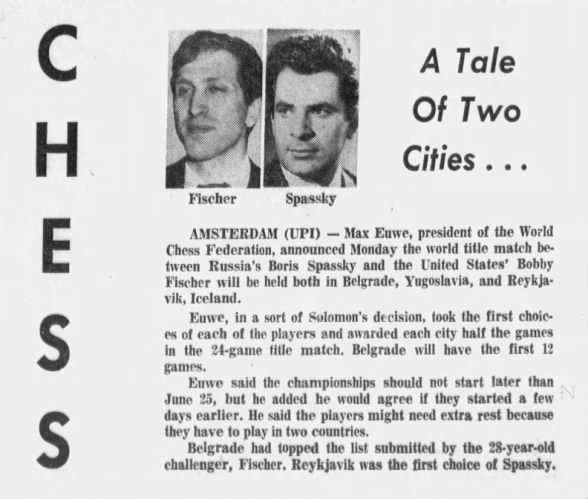 Chess: A Tale of Two Cities Tue, Feb 15, 1972 – 29 · Tampa Bay Times (St. Petersburg, Florida) · Newspapers.com
Chess: A Tale of Two Cities Tue, Feb 15, 1972 – 29 · Tampa Bay Times (St. Petersburg, Florida) · Newspapers.com
Daily News New York, New York Tuesday, February 15, 1972 - Page 117
Chess Match Site Is Chosen
Amsterdam Feb. 14 (UPI) The site and date for the world chess championship title match will be announced tomorrow, Max Euwe, president of the International Chess Federation, said today. Euwe refused to specify whether the decision on the site was the result of an agreement between American challenger Bobby Fischer and Soviet Boris Spassky, the titleholder. Euwe said last week that if the two could not compromise on a site, he would choose for them.
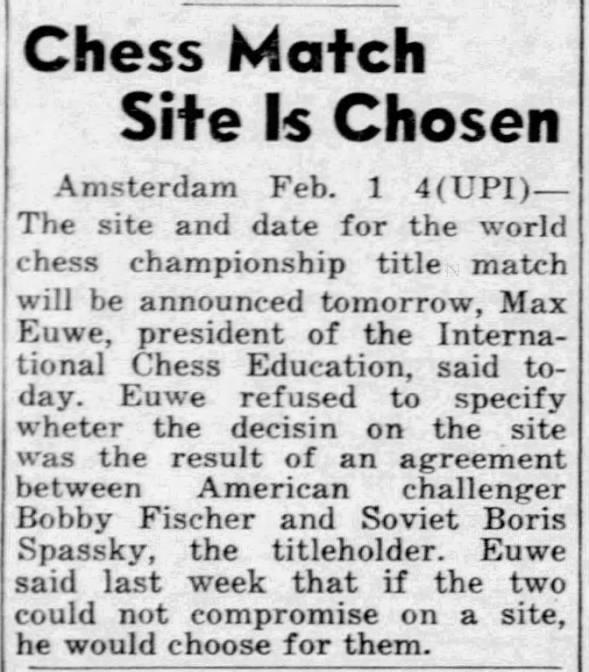 Chess Match Site Is Chosen Tue, Feb 15, 1972 – 117 · Daily News (New York, New York) · Newspapers.com
Chess Match Site Is Chosen Tue, Feb 15, 1972 – 117 · Daily News (New York, New York) · Newspapers.com
Daily News New York, New York Tuesday, February 15, 1972 - Page 156
Chess Series Set in Iceland & Yugoslavia
Amsterdam, Feb. 14 (UPI) — Max Euwe, president of the World Chess Federation, announced today that the world title match between the Soviet Union's Boris Spassky and Bobby Fischer of the United States will be held both in Belgrade, Yugoslavia, and Reykjavik, Iceland.
Euwe, in a compromise decision, took the first choices of each of the players and awarded each city half the games in the 24-game title match.
Belgrade will be the scene of the first 12 games.
Need for Extra Rest
Euwe said the championship match should not start later than June 25, but he added that he would agree to their starting several days earlier. He said the players might need extra rest because they have to play in two cities.
The decision ended two weeks of confusion over the site of the match. The location was to have been decided Jan. 31, but the preference lists submitted by each player did not coincide.
Belgrade had topped the list submitted by Fischer, the 28-year-old challenger. Reykjavik was the first choice of Spassky.
Tie Enough for Spassky
The match will not get to Reykjavik in the unlikely event that Spassky wins all of the first 12 games. In the case of a tie, Spassky retains his title. Fischer needs 12½ points to gain the title.
The communique noted that Belgrade had offered a prize fund of $150,000. Chess experts said the total prize money probably would be half of each—$137,500.
The prize money is expected to be split two thirds for the winner and one third for the loser.
The Journal Herald Dayton, Ohio Tuesday, February 15, 1972 - Page 3
Chess Bout To Be Held In 2 Cities
Amsterdam (UPI) — Max Euwe, president of the World Chess Federation, announced two sites yesterday for the world title match between the Soviet Union's Boris Spassky and Bobby Fischer of the United States.
Both Belgrade, Yugoslavia, and Reykjavik, Iceland, were selected.
Euwe, in a compromise decision, took the first choices of each of the players and awarded each city half the games in the 24-game title match.
Belgrade will be the scene of the first 12 games.
Euwe said the championship match should not start later than June 25, but he added in a communique he would agree if they started several days earlier. He said the players might need extra rest because they have to play in two cities.
Belgrade had topped the list submitted by Fischer, the 28-year-old challenger. Reykjavik was the first choice of Spassky.
The match will not get to Reykjavik if Spassky wins all first 12 games. In the case of a tie, Spassky retains his title. Fischer needs 12½ points to gain the title.
Euwe noted that Yugoslavia had offered a prize fund of $150,000 while Iceland had offered $125,000. Chess experts said the total prize money probably would be half of each — $137,500.
The prize money is expected to be split two-thirds for the winner and one-third for the loser.
Fischer earned his challenge to the title by trouncing his three opponents in the candidates' tournament in Buenos Aires last summer. He defeated Mark Taimanov of the Soviet Union, and Bent Larsen of Denmark by unprecedented 6-0 scores. In the final challenger round he beat former world champion Tigran Petrosian of the Soviet Union, 6½ points to 2½.
The Des Moines Register Des Moines, Iowa Tuesday, February 15, 1972 - Page 7
Sites Established For Chess Title
Amsterdam, The Netherlands (Reuter) — Dr. Max Euwe, Dutch president of the International Chess Federation, has ruled that the world title match between America's Bobby Fischer and the Russian title-holder, Boris Spassky, will be divided between Belgrade and Reykjavik.
The first 12 games would be played in Belgrade and the match would then switch to Reykjavik.
Dr. Euwe's ruling follows a deadlock between the players. Fischer did not include Reykjavik in his suggested list of sites and Spassky did not list Belgrade.
The first match will begin no later than June 25, Dr. Euwe ruled.
The Atlanta Constitution Atlanta, Georgia Wednesday, February 16, 1972 - Page 4
Cooling It?
Bobby Fischer, America's chess genius, is very cool toward the Russians who have dominated international chess tournaments for several decades.
Things aren't likely to warm up any when he meets Russian master Boris Spassky. Twelve games will be played in Yugoslavia, where the Russians aren't too popular. But the final 12 games will be played in Reykjavik, Iceland, a site Spassky picked possibly in the hope of cooling off Fischer's spectacular hot streak in master chess competition.
The Windsor Star Windsor, Ontario, Canada Wednesday, February 16, 1972 - Page 30
Quality is Counting by Jack Dulmage, Sports Editor
THE NEXT EXALTED confrontation between mercenaries of the state and slaves of the dollar is to occur in June between a Russian Boris Spassky, and an American Bobby Fischer.
This isn't quite up to the Cuban crisis, the Berlin Wall or the Vietnam war, but as a bloodless engagement between the forces of communism and capitalism, it should do pretty well.
Max Euwe, president of the International Chess Federation and a onetime world champion, has ruled that the first half of the best of 24 game world championship match will be played in Belgrade, Yugoslavia, the second half or what remains of it in Reykjavik, Iceland.
EUWE SIMPLY DIVIDED the first site preferences of the combatants. Spassky had sought Iceland, Holland, West Germany and France in that order.
Fischer had sought Belgrade, Sarajevo, Buenos Aires and Canada (Montreal) in that order.
There are several reasons why this match will attract more world attention than anything that has previously occurred in chess. And chess goes back a little — more than 1,400 years anyway.
For one, no American has ever been world champion. In fact, no American attained the final challenging round until Fischer knocked off Tigran Petrosian last October.
Paul Morphy, an American, was ranked the best of his time — he was United States champion from 1852 to 1862 — but that was prior to the start of recognition of official world champions which began in 1866 with Wilhelm Steinitz of Austria.
Morphy sort of faded away after his 10-year American reign. Fischer of Brooklyn, son of European born parents, is 28 and was a child genius. He won the U.S. championship at the age of 14. He has held it three different times including the present for a total of nine years.
A DECADE AGO, Fischer was earmarked for climbing the tournament ladder to a world match, but he balked and refused to compete, charging the Russians with collusions in elimination tournament play.
The Russians have been very powerful in chess since the end of World War II. Fischer claimed they were rigging tournaments by going all out against foreigners while playing ties among themselves to pad superior standing positions.
Fischer was probably right. He demanded to have his own way which was two-man knockout competition, and he finally got it. Head to head, he is considered the toughest chess player to come down the pike.
FISCHER KNOCKED OFF three big wheels without losing a game before he flattened Petrosian at Buenos Aires. Petrosian was world champion from 1963 to 1967.
The Russians took over the world championship in 1948 when Mikhail Botvinnik began a reign of eight years. The came Vasily Smyslov, Botvinnik again, then Mikhail Tal, Botvinnik again, then Petrosian and finally Spassky in 1969.
Prior to this post-war rule, the Russians didn't figure. Steinitz, the first champion, ruled 28 years. After him came Dr. Emanuel Lasker of Berlin who last 27 years.
Then, there was Jose Capablanca of Havana for six years in the early twenties, Dr. Alexander Alekhine of Paris for eight, Dr. Euwe of Holland for three, Dr. Alekhine again for nine and then the Russian onset with Botvinnik.
FISCHER IS PLAYING this match for money, the lion's share of almost $300,000. Whatever share Spassky winds up with, it becomes most curious whether the USSR will allow him to pocket it like a prize fighter.
It may be that Spassky's end will go directly into state coffers and come back to him indirectly by such emoluments as the USSR chooses to confer.
BELGRADE, an Iron Curtain city, and Reykjavik, capital of a free republic, entered the auction with $150,000 and $125,000 respectively. Belgrade isn't Moscow, but it's within the Russian orbit.
Perhaps, the way for the Russians to proceed in hockey is to make a money contract match between Prague and the National Hockey League, rather than between the USSR and the NHL.
This guy Fischer could be a new dimension in international bridge-building.
The Baltimore Sun Baltimore, Maryland Wednesday, February 16, 1972 - Page 10
Of Chess Players and Diplomats
In Sapporo, Avery Brundage cast a wary eye over the purity of amateur athletes competing in the Olympics. In Baltimore, Governor Mandel and Mayor Schaefer dangled an opulent stadium complex before the city's restless professionals. But in Amsterdam, the International Chess Federation was having troubles of its own.
Bobby Fischer, United States grand master, and Boris Spassky, the Russian world champion, couldn't get together on an agreeable site for this summer's title match. Mr. Fischer, acting more like Carroll Rosenbloom than Avery Brundage, wanted Belgrade. The simple reason: The Yugoslavs had offered more prize money, $152,000. Mr. Spassky, on the other hand, was applying cold Russian logic and demanding Reykjavik, Iceland. He had no intention of spending the tortuous 24-game match over a hot Adriatic chessboard.
Charges and counter-charges strained diplomatic patience. Russian negotiators cried foul even before the first white pawn had been moved. It looked like another item to be added to the Nixon agenda for pending talks with the Kremlin. Finally, Dr. Max Euwe, president of the chess federation, came up with a solution. Twelve games will be played in Belgrade, and 12 in Reykjavik.
Though he probably never will win a Nobel Peace Prize, Dr. Euwe nevertheless demonstrated the chess player's cool and amazing skill for seizing the option. We congratulate him. And now, chess fans, we can all happily return to the more important question of who shall it be. Fischer or Spassky?
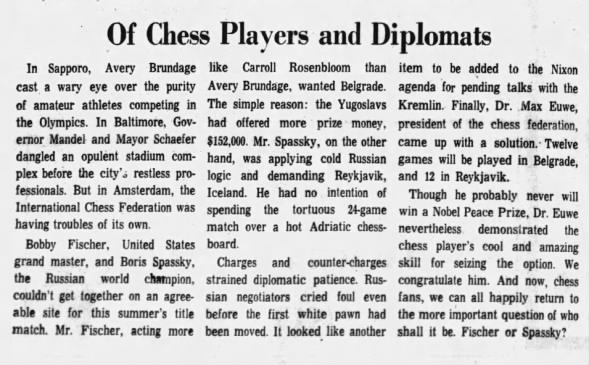 Of Chess Players and Diplomats Wed, Feb 16, 1972 – 10 · The Baltimore Sun (Baltimore, Maryland) · Newspapers.com
Of Chess Players and Diplomats Wed, Feb 16, 1972 – 10 · The Baltimore Sun (Baltimore, Maryland) · Newspapers.com
The Herald-News Passaic, New Jersey Wednesday, February 16, 1972 - Page 3
Iceland Seeks Chess Details
Reykjavik, Iceland (AP) — The president of the Icelandic Chess Federation expressed surprise yesterday at the decision to hold the Spassky-Fischer world championship match in both Reykjavik and Belgrade, Yugoslavia.
Gudmundur Thorarinsson said Iceland was not fully consulted and planned to seek clarification of the terms under which the match will be split.
The International Chess Federation in Amsterdam announced Monday that Soviet titleholder Boris Spassky and American challenger Bobby Fischer will play the first 12 games in Belgrade and the final 12 in Reykjavik.
Thorarinsson said an agreement between the two cities must be reached on how to split costs and payment of the winner's purse.
Iceland will take a gamble in hosting the second half of the contest because the match could be decided in Belgrade, he said.
The match was divided because the players could not agree on a location for the match, set to begin no later than June 25. Spassky wanted Reykjavik and Fischer favored Belgrade.
The Berkshire Eagle Pittsfield, Massachusetts Friday, February 18, 1972 - Page 16
A Mighty Stalemate in the Chess World
A stalemate in chess occurs when a player cannot move any piece except his king and cannot move his king without putting it in check, the result being a draw. A stalemate in setting up a site for a world chess championship match occurs when our king, Bobby Fischer, and their king, Boris Spassky, cannot agree on which city should have the honor.
Honor doesn't have too much to do with it because Fischer has made it plain that the honor should go to whichever city guarantees the most money for the players—five-eighths to the winner and three-eighths to the loser.
Belgrade, Yugoslavia, came up with the highest bid, $152,000, a good move as far as Fischer was concerned, but Spassky held out for Reykjavik, Iceland, which had offered a mere $125,000. It seemed that the Russian defender is as interested in playing in a climate closest to his native steppe, Leningrad, as he is in the rubles.
In order to get things moving again, the International Chess Federation has ruled that the match, scheduled to start in June, will be split between Belgrade and Reykjavik, 12 games in Yugoslavia and whatever is needed of the other 12 in Iceland. Splitting the difference in the bids brings the figure to $138,500, which is better than a fool's mate.
However, neither party has indicated whether or not this move is acceptable. There are the pawns of Montreal, Buenos Aires, Sarajevo, Amsterdam, Paris and Dusseldorf still on the board. Fischer is brooding in his castle and the Russians are looking for rookery. It could be that when the match does come off, it will be anti-climactic.
The Gazette Montreal, Quebec, Canada Friday, February 18, 1972 - Page 6
Next Move
Thanks to binding arbitration, a small international problem has been settled and the most exciting world championship chess match since the Second World War can proceed.
The problem was where Boris Spassky of the USSR, the current title holder, preferred Reykjavik. Bobby Fischer, the prickly, monomanic [#AutismAwareness] U.S. challenger, wanted Belgrade (it had offered to put up the most money). Dr. Max Euwe, president of the International Chess Federation, has decided with Solomonic logic to hold the first 12 games of the 24-game match in Yugoslavia and the last 12 in Iceland.
The world chess title is now defended once every three years. What generates especial excitement this year is Fischer, the first non-Soviet challenger since the death of Alekhine — and he was an expatriate Russian — in 1946.
Some Canadians find it incredible, but Fischer's record in his field probably surpasses that of, say, Bobby Orr in hockey or Willie Mays in baseball. Around the world he is much better known, and like the others, his presence in a game generates an electric tension.
And so, not later than June 25, the contest will be on. The exact date has not yet been set, but thanks to the arbitrator, the sticking point has been passed. It is too bad this technique cannot be applied to larger international difficulties.
The Salt Lake Tribune Salt Lake City, Utah Saturday, February 19, 1972 - Page 4
Russian Group Protests Sites for Chess Matches
Moscow (AP) — The Soviet Chess Federation has protested the selection of two cities as host to the world championship chess match between the Russian titleholder, Boris Spassky, and the American challenger, Bobby Fischer, Tass said Friday night.
The official news agency said the federation lodged the protest with Prof. Max Euwe, president of the International Chess Federation (FIDE), who lives in Amsterdam.
To settle an impasse on the site for the match, Euwe announced Feb. 14 that both Reykjavik, Iceland, and Belgrade, Yugoslavia, would play host to the 24-game match. Euwe said in a communique the first 12 games would be played in Belgrade and the other 12 in Reykjavik.
No Possibility
Spassky had listed Reykjavik as his first choice and Fischer had listed Belgrade. Euwe said he was forced to split the match between two cities because there was no possibility the men could agree on a single compromise city.
“To hold the match in two cities is against the rules of the International Chess Federation,” Tass claimed.
In view of this, the agency said, “the Soviet Chess Federation on Feb. 17 lodged a protest with Mr. Euwe and reaffirmed its position expressed in the statement of the USSR Chess Federation at a Moscow press conference” Feb. 11.
The president of the Soviet federation, Dmitry V. Postnikov, said at a news conference the Soviets had protested previous “nonobservance” of FIDE “regulations and procedures.”
Belgrade Too Hot
He added that the Soviet side would not consider itself bound by a FIDE decision on the match site if, in their view, the federation's rules were further violated.
Soviet chess officials have said Belgrade is not suitable because of the hot climate.
The Philadelphia Inquirer Philadelphia, Pennsylvania Saturday, February 19, 1972 - Page 16
Checkmate or Stalemate?
American chess champion Bobby Fischer and defending world champion Boris Spassky of the Soviet Union were unable to agree on a site for their world title match so the International Chess Federation has ruled that the first half of the match will be in Belgrade, Yugoslavia, which was Mr. Fischer's choice, and the second half in Reykjavik, Iceland, Mr. Spassky's selection. No doubt the next phase of negotiations will be on the shape of the board.
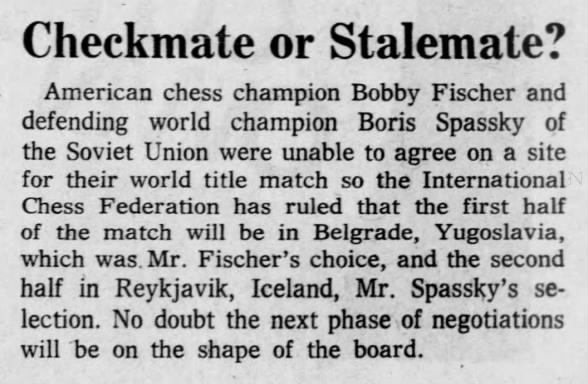 Checkmate or Stalemate? Sat, Feb 19, 1972 – Page 16 · The Philadelphia Inquirer (Philadelphia, Pennsylvania) · Newspapers.com
Checkmate or Stalemate? Sat, Feb 19, 1972 – Page 16 · The Philadelphia Inquirer (Philadelphia, Pennsylvania) · Newspapers.com
The Boston Globe Boston, Massachusetts Sunday, February 20, 1972 - Page 81
Fischer vs. Spassky: A Classic in Slow Motion by Harold Kaese
The Boston Chess Studio on Newbury Street has eight tables for playing. All were filled Friday afternoon. The action was slow, but strategious. By the end of Summer, the Studio may need more tables—many more.
The Fischer-Spassky match is coming, the chess Match of the Century, the Super Match, the World Series of the checkmate.
Challenger: Bobby Fischer, 28, Brooklyn-bred, aggressive, daring, frequently accused of being offensive (by offensive people).
Champion: Boris Spassky, 35, an attack become conservative, genial, popular, three years on top.
Russian chess players are better than Russian Olympic hockey players. Seven different Russians have held the world title consecutively since 1948.
An American has never held it, since it was officially created in 1866, although Paul Morphy (1837-84) was preeminent.
But London bookmakers have made Fischer a 5-4 favorite.
The match starts June 25 in Belgrade. The first 12 matches will be held in the Yugoslavia capital. The next 12 — if all are needed — will be held in Reykjavik, capital of Iceland.
All probably will not be needed. If they are, it will be the most thrilling match ever played, even for the 95 percent of the world's population that doesn't know a rook from a pigeon.
To win the championship, Fischer must win 12½ points — on point for a game won, ½ point for a game drawn. Spassky keeps his title if he wins 12 points.
Victory will mean a fortune for the winner. He gets 67 percent of most of the take—$152,000 from Belgrade, $125,000 from Iceland, plus 60 percent of the TV revenue.
These details were supplied by Gisbert Helmreich, proprietor of the Chess Studio, which besides its playing tables has a shop with over 700 chess book titles, and equipment, such as tables, sets and clocks.
Helmreich, who came here from West Germany in 1966 and married to a Boston woman, doesn't know if he can swing it, but that doesn't keep him from dreaming of going to Reykjavik.
“Two weeks. How wonderful it would be. As exciting for me a World Series for you. I'd have my own little set with me, and I'd make the moves as they were shown on the big demonstration board.”
Waiting for Fischer to move would — for a non-chess player — be much worse than waiting for Bill Monbouquette to pitch the ball, but not for Helmreich.
The pace is so slow that after a game has gone five hours and is not decided, it is adjourned until the next day, and — in fact — it might even be adjourned again to still another day.
“They probably won't play more than three games a week. Players are entitled to take a rest. The match may take two months,” said Helmreich.
“That's not a match,” said an ignorant interrogator. “That's a whole season.”
Never will so many people knowing so little about a subject be so deluged with biographies, inside stories, analyses and propaganda as they are going to be in what may be remembered as civilization's Fischer-Spassky Era. Most people know more about the physics of space than they do of chess.
But Helmreich protested, “Last year three million chess sets were sold in this country.”
“I have one,” said his interviewer. “Look under the highest pile of dust in my apartment and you'll find it.”
“It's our fastest growing sport, or hobby,” he went on. “The United States Chess Foundation has 26,000 serious players. Russia, of course, has four million.”
He thought a moment and added, “There should be a big boom because of this match, especially if Fischer wins. Now, if we could only get more women to play chess. You know, it doesn't seem to be a woman's game. I have no explanation.”
Only two or three women a week visit his tables on Newbury St., and its not the price that keeps them away — 40 cents an hour. Maybe that's where Women's Lib will eventually lead us — a woman for the world chess champion. How about it, dear?
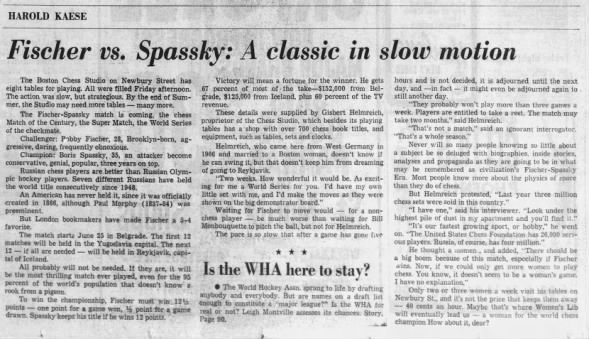 Fischer vs. Spassky: A Classic in Slow Motion Sun, Feb 20, 1972 – 81 · The Boston Globe (Boston, Massachusetts) · Newspapers.com
Fischer vs. Spassky: A Classic in Slow Motion Sun, Feb 20, 1972 – 81 · The Boston Globe (Boston, Massachusetts) · Newspapers.com
The Greenville News Greenville, South Carolina Tuesday, February 22, 1972 - Page 19
Chess President Rejects Protest
Amsterdam (UPI) — The president of the World Chess Federation rejected Monday a Soviet protest of his decision that the world chess championship match between Boris Spassky of the Soviet Union and challenger Bobby Fischer of the United States should be held in Belgrade and Reykjavik.
The president, Max Euwe, said the Soviet Chess Federation had told him in a telegram that it did not agree with the decision, which it said violated the rules.
He said he had cabled back that the World Chess Congress of 1971 stipulated that the federation's president should decide where the championship match should be held if the two players could not agree on a site.
Spassky and Fischer had chosen several sites, Spassky included Reykjavik, the Icelandic capital, among his choices and Fischer chose Belgrade on his list of sites. Neither could agree, and two weeks ago Euwe announced that the 24-game match would be divided evenly between the two cities as a compromise, assuming the match went the distance of 24 games.
The first 12 games will begin in Belgrade in July.
Euwe also said he had told the Russians that there was no special body within the federation to deal with their protest and that the matter only could be considered at the congress session in the fall. He said that would be too late.
Euwe suggested that the protest be discussed at the scheduled March 2-3 meeting in Moscow of the International Federation Bureau, but he pointed out that the bureau does not have the authority to cancel the decision about the site of the match.
Fischer won the right to challenge Spassky by beating Soviet champion Tigran Petrosian in Buenos Aires last year.
Asbury Park Press Asbury Park, New Jersey Tuesday, February 22, 1972 - Page 21
New Parley Slated on Title Chess
Amsterdam (AP) — New consultations about a site for the world championship chess match between titleholder Boris Spassky of the Soviet Union and challenger Bobby Fischer of the United States will be held next month in Moscow, the secretariat of the World Chess Federation — FIDE — announced yesterday.
The Russians protested the decision of FIDE president Dr. Max Euwe to split the match between Belgrade, Yugoslavia, and Reykjavik, Iceland. The secretariat said that although under FIDE rules the decision could only be reversed by the FIDE congress, Euwe was prepared to discuss the issue in Moscow. The FIDE board is to meet there March 2 and 3.
Democrat and Chronicle Rochester, New York Friday, February 25, 1972 - Page 6
Checkmate Russia?
Around newspapers there is a bit of a problem in how to classify chess. When the University of Rochester announced the UR chess team's recent victory over Princeton, its public relations department addressed the release to sports editors. The win gave the UR the Eastern Intercollegiate Team championship.
The city chess championship at Central YMCA last weekend, won by Dr. Erich Marchand, four times state champion and a former national amateur champion, was treated as a news feature. Robert Fischer, 28, who won his first U.S. title at 14, seldom makes the sports pages but he's a constant subject of general news and magazine features.
Whether its a sport, a form of recreation, or an exercise in concentration, the “game of kings,” dating back to ancient Hindustan, is thought of as a diversion of intellectuals because of its complexity. The total possible combination of moves en route to a checkmate or a draw, according to Dr. Marchand, are infinite. Hence, chess is an endless challenge to the player's resourcefulness. One would assume there's little muscle required in moving the chessmen, thus limiting interest in chess as a sport. But studied have shown that the physical strain of tournament chess can equal five sets of tennis.
Nor should anyone belittle chess as a game of international interest. American prestige will be on the line next June when the inimitable Bobby Fischer matches moves with Russia's Boris Spassky in the world title contest.
Soviet boosters have been saying the U.S. could not produce a world champion because of “defects in the capitalist system.” Viewed thus, more than a chess title is at stake.
Sports Illustrated February 26, 1972
The Fischer-Spassky Go
When Bobby Fischer bombed Tigran Petrosian off the chessboard last fall and earned the right to meet Boris Spassky of the Soviet Union for the world championship, interest in chess soared. In the past, the Federation Internationale des Echecs (FIDE) would have routinely announced a neutral site where the championship would be played, and the story would have appeared as a one-inch item somewhere near the bottom of page 23 in your local newspaper.
But with B. Fischer around things are different. This time 15 cities from 12 countries bid for the privilege of staging the 24-game match, and by chess standards the bids were astronomical. For instance, Reykjavik, Iceland, offered $125,000, and Belgrade, Yugoslavia, the highest bidder, came in with $152,000 ($95,000 for the winner, $57,000 for the loser).
But the final selection was not just a matter of money, for chess players, a sensitive lot, have very definite ideas on where they will or will not play. Spassky liked Reykjavik; Fischer did not. Under FIDE regulations, each side had to submit a list of acceptable places by a date late in January. Total stalemate.
The Russians claimed the Americans did not file by deadline; the Americans said the deadline was later than the Russians said it was. In any event, they failed to come up with a mutually acceptable city. The decision was then up to Dr. Max Euwe, president of FIDE. Euwe pondered and announced a compromise: the first 12 games would be in Belgrade, the last 12 in Reykjavik.
A decision worthy of a Solomon, except that neither Fischer nor the Russians accepted it. The Russians protested that Dr. Euwe had violated FIDE rules. Fischer was incommunicado.
There, last week, the matter uneasily rested. Some observers suggested that the Russians, unnerved by Fischer's resounding triumphs, would just as soon Spassky avoided him entirely. Others held that the entire affair was a sort of pre-chess game, with moves and countermoves designed to psych the other side.
Non-chess fans could not help but feel that it was all beginning to sound like the publicity buildup for an Ali-Frazier fight.
The Salina Journal Salina, Kansas Sunday, February 27, 1972 - Page 14
Chess Match in Check Before a Pawn is Moved
Christian Science Monitor News Service
Moscow—The battle already is joined.
Even before the actual confrontation between Soviet world chess champion Boris Spassky and United States challenger Bobby Fischer, a wrangle has developed over the venue and date of the match.
The Russians charge that the rules of the World Chess federation have been violated and express pique that the youthful American turned down a preliminary agreement to hold the tournament in the Icelandic capital of Reykjavik beginning June 25.
Moreover, they say, inasmuch as the procedures of the world federation were broken, they will not necessarily be bound by a decision made by Dr. Max Euwe, president of the body, to break the deadlock. (It is the understanding of the U.S. side that if negotiations prove fruitless, the president will prick the site subject to one veto by each player.)
The drama grows. The Russians say they received a telegram from Euwe suggesting a “European city” proposed by Fischer. This presumably would be Belgrade or Sarajevo, both in Yugoslavia, both of which were on the American's list — and both of which Spassky is thought to object to on grounds of hot climate.
Annoyed
Clearly annoyed over the whole affair, officials of the U.S.S.R. Chess federation called a press conference to air their case.
Euwe, they said, established that both sides were to communicate their preferences to the world federation by Jan. 27.
The Soviets sent their list on time, naming the cities of Reykjavik, Amsterdam, Dortmund, and Paris. The American challenger did not send in a list until Jan. 31. (It included, in addition to the Yugoslav cities, Montreal, Buenos Aires, and Chicago.)
Contrary to world federation rules, the Russians charged, Euwe went back on his own decision, accepted the Jan. 31 date as valid, and since none of the cities listed coincided, established an addition 10-day period for the two to agree.
The Soviets protested this procedure but agreed to receive Col. Edmund Edmondson, director of the U.S. Chess Federation, for negotiations.
As a result of the Moscow talks, a preliminary agreement on Iceland was reached Feb. 7, and it was to be made public on Feb. 10, after both champion and challenger had approved it. But Fischer declined.
News Conference
At the news conference, the Soviet chess officials also pointed out that it is the tradition for the reigning chess champion to select the venue, but that Spassky “does not demand any preference,” having listed 4 different cities.
Fischer, it was noted, has repeatedly indicated that his main consideration is monetary, a demand considered the religious and other habits of Fischer in the past, although this disrupted their “usual rhythm and order of play.”
Anyone's guess
What happens at this juncture is anyone's guess. Last month a Soviet newspaper quoted Spassky as saying over television that if he and Fischer could not agree about a venue, one half of the match would take place in the U.S.S.R. and the other in the United States.
Fischer, who temper and idiosyncrasies are as famous as his great skill at chess, long has been criticized in the official press here for what Russians Soviets regard as an imperious attitude.
The Akron Beacon Journal Akron, Ohio Sunday, February 27, 1972 - Page 157
For 15 Centuries People Have Become Chess Nuts
story by Abe Zaidan, cover and inside illustrations by Chuck Ayers
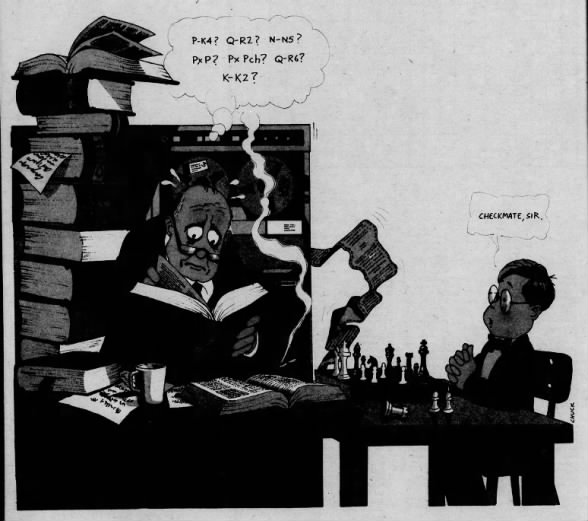 Checkmate, Sir Sun, Feb 27, 1972 – Page 144 · The Akron Beacon Journal (Akron, Ohio) · Newspapers.com
Checkmate, Sir Sun, Feb 27, 1972 – Page 144 · The Akron Beacon Journal (Akron, Ohio) · Newspapers.com
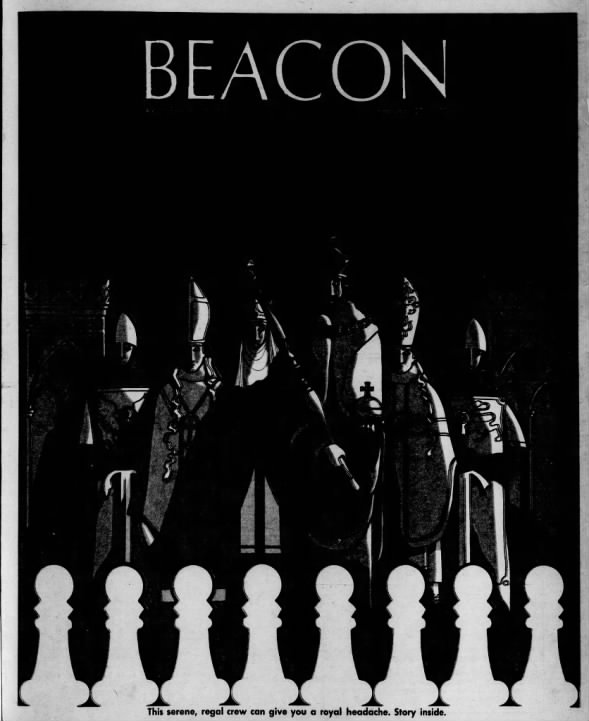 Beacon Sun, Feb 27, 1972 – Page 139 · The Akron Beacon Journal (Akron, Ohio) · Newspapers.com
Beacon Sun, Feb 27, 1972 – Page 139 · The Akron Beacon Journal (Akron, Ohio) · Newspapers.com
This serene, regal crew can give you a royal headache. Story inside.
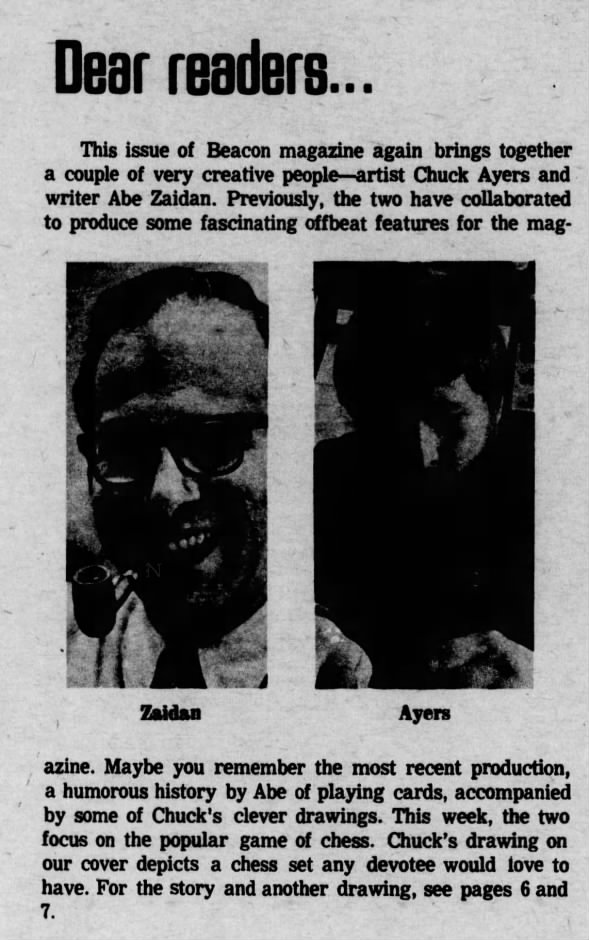 Dear Readers Sun, Feb 27, 1972 – Page 140 · The Akron Beacon Journal (Akron, Ohio) · Newspapers.com
Dear Readers Sun, Feb 27, 1972 – Page 140 · The Akron Beacon Journal (Akron, Ohio) · Newspapers.com
Dear Readers…
This issue of Beacon magazine again brings together a couple of very creative people—artist Chuck Ayers and writer Abe Zaidan. Previously, the two have collaborated to produce some fascinating offbeat features for the magazine. Maybe you remember the most recent production, a humorous history by Abe of playing cards, accompanied by some of Chuck's clever drawings. This week, the two focus on the popular game of chess. Chuck's drawing on our cover depicts a chess set any devotee would love to have. For the story and another drawing, see pages 6 and 7.
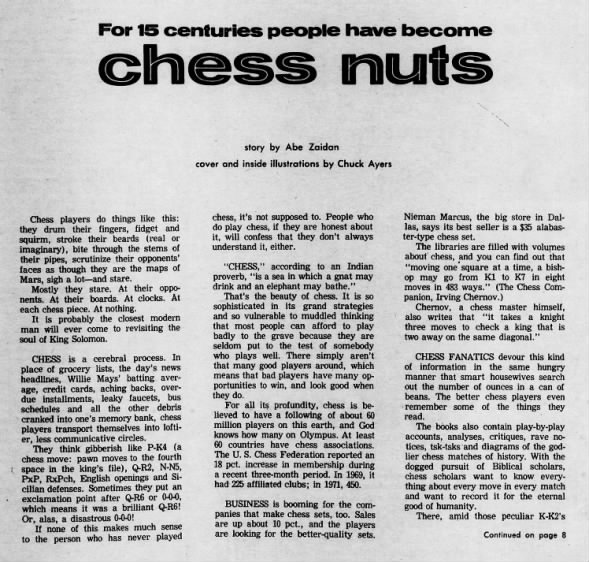 Chess Nuts Sun, Feb 27, 1972 – Page 145 · The Akron Beacon Journal (Akron, Ohio) · Newspapers.com
Chess Nuts Sun, Feb 27, 1972 – Page 145 · The Akron Beacon Journal (Akron, Ohio) · Newspapers.com
Chess players do things like this: they drum their fingers, fidget and squirm, stroke their beards (real or imaginary), bite through the stems of their pipes, scrutinize their opponents' faces as though they are the maps of Mars, sigh a lot—and stare.
Mostly they stare. At their opponents. At their boards. At clocks. At each chess piece. At nothing.
It is probably the closest modern man will ever come to revisiting the soul of King Solomon.
CHESS is a cerebral process. In place of grocery lists, the day's news headlines, Willie Mays' batting average, credit cards, aching backs, overdue installments, leaky faucets, bus schedules and all the other debris cranked into one's memory bank, chess players transport themselves into loftier, less communicative circles.
They think gibberish like P-K4 (a chess move: pawn moves to the fourth space in the king's file), Q-R2, N-N5, PxP, RxPch, English openings and Sicilian defenses. Sometimes they put an exclamation point after Q-R6 or O-O-O, which means it was a brilliant Q-R6! Or, alas, a disastrous O-O-O!
If none of this makes much sense to the person who has never played chess, it's not supposed to. People who do play chess, if they are honest about it, will confess that they don't always understand it, either.
“CHESS,” according to an Indian proverb, “is a sea in which a gnat may drink and an elephant may bathe.”
That's the beauty of chess. It is so sophisticated in its grand strategies and so vulnerable to muddled thinking that most people can afford to play badly to the grave because they are seldom put to the test of somebody who plays well. There simply aren't that many good players around, which means that bad players have many opportunities to win, and look good when they do.
For all its profundity, chess is believed to have a following of about 60 million players on this earth, and God knows how many on Olympus. At least 60 countries have chess associations. The U.S. Chess Federation reported an 18 pct. increase in membership during a recent three-month period. In 1969, it had 225 affiliated clubs; in 1971, 450.
BUSINESS is booming for the companies that make chess sets, too. Sales are up about 10 pct., and the players are looking for the better-quality sets. Nieman Marcus, the big store in Dallas, says its best seller is a $35 alabaster-type chess set.
The libraries are filled with volumes about chess and you can find out that “moving one square at a time, a bishop may go from K1 to K7 in eight moves in 483 ways.” (The Chess Companion, Irving Chernov.)
Chernov, a chess master himself, also writes that “it takes a knight three moves to check a king that is two away on the same diagonal.
CHESS FANATICS devour this kind of information in the same hungry manner that smart housewives search out the number of ounces in a can of beans. The better chess players even remember some of the things they read.
The books also contain play-by-play accounts, analyses, critiques, rave notices, tsk-tsks and diagrams of the godlier chess matches of history. With the dogged pursuit of Biblical scholars, chess scholars want to know everything about every move in every match and want to record it for the eternal good of humanity.
There, amid those peculiar K-K2's
Continued on page 8
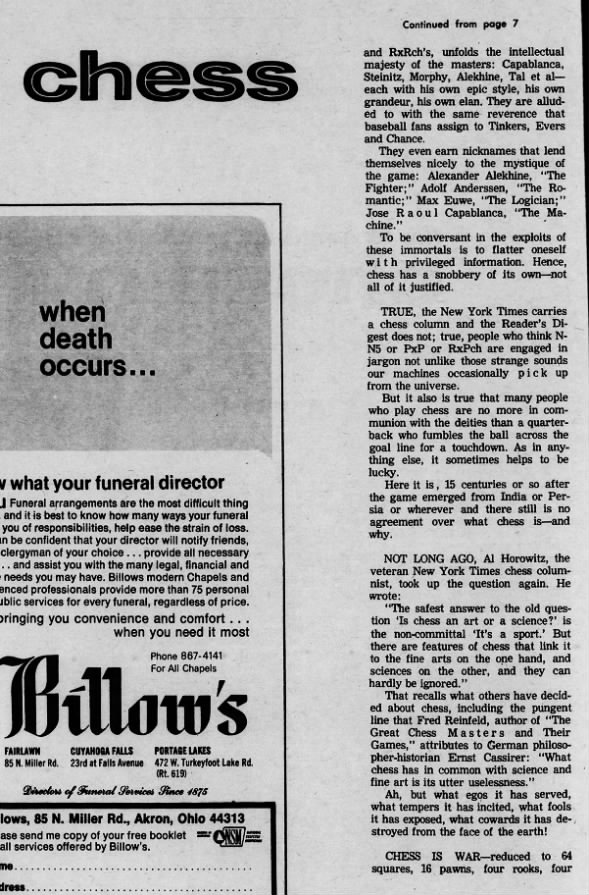 Chess Sun, Feb 27, 1972 – Page 146 · The Akron Beacon Journal (Akron, Ohio) · Newspapers.com
Chess Sun, Feb 27, 1972 – Page 146 · The Akron Beacon Journal (Akron, Ohio) · Newspapers.com
Continued from page 7
and RxRch's, unfolds the intellectual majesty of the masters: Capablanca, Steinitz, Morphy, Alekhine, Tal et al — each with his own epic style, his own grandeur, his own elan. They are alluded to with the same reverence that baseball fans assign to Tinkers, Evers and Chance.
They even earn nicknames that lend themselves nicely to the mystique of the game: Alexander Alekhine, “The Fighter;” Adolf Anderssen, “The Romantic;” Max Euwe, “The Logician;” Jose Raoul Capablanca, “The Machine.”
To be conversant in the exploits of these immortals is to flatter oneself with privileged information. Hence, chess has a snobbery of its own—not all of it justified.
TRUE, the New York Times carries a chess column and the Reader's Digest does not; true, people who think N-N5 or PxP or RxPch are engaged in jargon not unlike those strange sounds our machines occasionally pick up from the universe.
But it also is true that many people who play chess are no more in communion with the deities than a quarterback who fumbles the ball across the goal line for a touchdown. As in anything else, it sometimes helps to be lucky.
Here it is, 15 centuries or so after the game emerged from India or Persia or wherever and there still is no agreement over what chess is—and why.
NOT LONG AGO, Al Horowitz, the veteran New York Times chess columnist, took up the question again. He wrote:
“The safest answer to the old question ‘Is chess an art or a science?’ is the non-committal ‘It's a sport.’ But there are features of chess that link it to the fine arts on the one hand, and sciences on the other, and they can hardly be ignored.”
That recalls what others have decided about chess, including the pungent line that Fred Reinfeld, author of “The Great Chess Masters and Their Games,” attributes to German philosopher-historian Ernst Cassirer: “What chess has in common with science and fine art is its utter uselessness.”
Ah, but what egos it has served, what tempers it has incited, what fools it has exposed, what cowards it has destroyed from the face of the earth!
CHESS IS WAR—reduced to 64 squares, 16 pawns, four rooks, four
 Chess Nuts Sun, Feb 27, 1972 – Page 147 · The Akron Beacon Journal (Akron, Ohio) · Newspapers.com
Chess Nuts Sun, Feb 27, 1972 – Page 147 · The Akron Beacon Journal (Akron, Ohio) · Newspapers.com
bishops, four knights, two queens and two kings, divided equally between the two combatants.
The earliest traces of the game suggest an Indian origin in the Sixth or Seventh Century. Chess historians say an Indian philosopher developed the game to symbolize the warring of two Indian armies and named it &lduqo;chaturanga,” Sanskrit for “the army game.”
The pawns were the foot-soldiers; the rooks, chariots; the knights, horsemen; the bishops, elephants (the evolution here is a little harder to follow); the queen, minister; the king, king.
The object of chess today, as it was then, is to annihilate the king by destroying his army.
SOME RELIGIONS denounced chess. Caliphs, of course, loved it. “There is nothing wrong in it,” one ancient caliph is said to have enthused. &lduqo;It has to do with war.”
The early history of chess abounds with tales of how those 64 squares shaped men's lives. Military battles were lost while generals dallied in their war rooms fussing over RxB or QxPch. Lustful noblemen moved their chessboards to the ladies' boudoirs, where their ploys were forever lost to history. Stricken by the call of the board, men gave up promising careers as lawyers and businessmen to dedicate themselves to a monastic existence amid pawns, knights and bishops.
Those who thirsted for even more stylish military victories (“You cannot play at chess if you are kind-hearted,” says a French proverb) learned to play blindfolded; one hot-shot is said to have taken on 45 opponents at once, playing from memory.
IN SWEDEN, in the late 19th Century, they played with costumed men as chess pieces on a 4,305 square-foot board. Earlier, an Austrian mechanic, Wolfgang von Kempelen, even resorted to “automated chess”—devising a mechanical man who sat at the board and responded to each move by a live player. It was a trick, but fully complimentary of the many deceits of chess strategy: Wolfgang had stationed a skillful player inside the automaton and he was eventually exposed.
The scheme, brilliant though it was, was checkmated.
Perhaps the biggest news in chessdom today, at least in America, is that the game is grabbing headlines in the popular media because the Republic
Continued on page 19
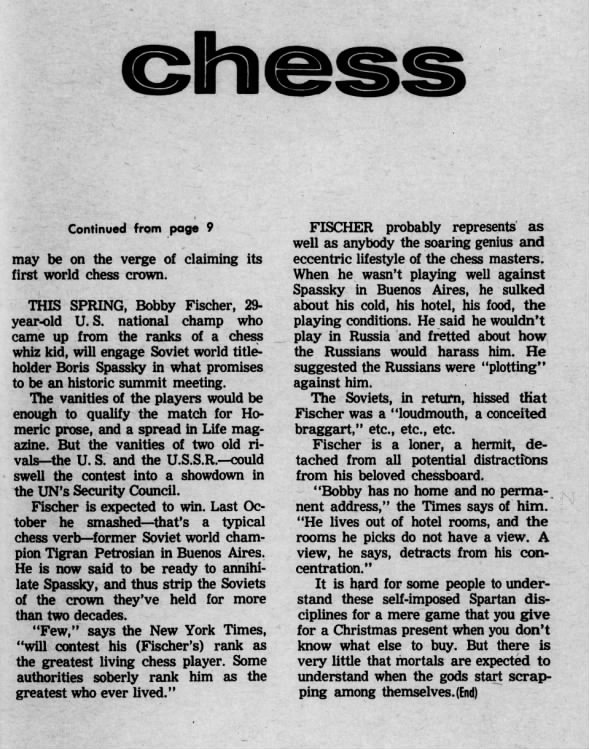 Chess Sun, Feb 27, 1972 – Page 157 · The Akron Beacon Journal (Akron, Ohio) · Newspapers.com
Chess Sun, Feb 27, 1972 – Page 157 · The Akron Beacon Journal (Akron, Ohio) · Newspapers.com
Continued from page 9
may be on the verge of claiming its first world chess crown.
THIS SPRING, Bobby Fischer, 29-year-old U.S. national champ who came up from the ranks of a chess whiz kid, will engaged Soviet world title-holder Boris Spassky in what promises to be an historic summit meeting.
The vanities of the players would be enough to qualify the match for Homeric prose, and a spread in Life magazine. But the vanities of two old rivals—the U.S. and the U.S.S.R.—could swell the contest into a showdown in the UN's Security Council.
Fischer is expected to win. Last October he smashed—that's a typical chess verb—former Soviet world champion Tigran Petrosian in Buenos Aires. He is now said to be ready to annihilate Spassky, and thus strip the Soviets of the crown they've held for more than two decades.
“Few,” says the New York Times, “will contest his (Fischer's) rank as the greatest living chess player. Some authorities soberly rank him as the greatest who ever lived.”
FISCHER probably represents as well as anybody the soaring genius and lifestyle of the chess masters. When he wasn't playing well against Petrosian in Buenos Aires, he sulked about his cold, his hotel, his food, the playing conditions. He said he wouldn't play in Russia and fretted about how the Russians would harass him. He suggested the Russians were “plotting” against him.
The Soviets, in return, hissed that Fischer was a “loudmouth, a conceited braggart,” etc., etc., etc.
Fischer is a loner, a hermit, detached from all potential distractions from his beloved chessboard.
“Bobby has no home and no permanent address,” the Times says of him. “He lives out of hotel rooms, and the rooms he picks do not have a view. A view, he says, detracts from his concentration.”
It is hard for some people to understand these self-imposed Spartan disciplines for a mere game that you give for a Christmas present when you don't know what else to buy. But there is very little that mortals are expected to understand when the gods start scrapping among themselves.(End)
The Record Hackensack, New Jersey Sunday, February 27, 1972 - Page 59
New Move for Chess
Editor, The Record: I read with greatest interest Miss Nina Wood's article in the Feb. 7 The Record about the growth of interest in chess in Bergen County, undoubtedly largely due to the spectacular career of Bobby Fischer. I was particularly pleased to learn of instruction in the schools of Englewood and other Bergen municipalities, in addition to the formation of chess clubs for players over 18.
I was taught the moves by an uncle who also taught my older brother, and we both played on our high school team in Brooklyn. We played a lot with each other, and subsequently joined the Brooklyn Chess Club, one of two or three leading clubs in the country at the time. We made many friends through chess. We never had to worry about how to amuse ourselves in summer. We bought chess magazines and books with our joint allowances and learned that chess is a really cheap pastime, because three or four chess books (one of the openings, one on the end game, and one or two collections of tournaments or matches) would keep an ardent chess player busy perhaps a year. There are excellent chess magazines everywhere. An excellent way to study German or another foreign language is to study a manual or collection of games in that language. There are excellent weekly chess columns in American papers. Public libraries have books on chess. Games can be played by correspondence. It is a universal game and almost every country has chess players. It is a fine army or other service game. I hope Bergen County schools and others will take up the game in a big way.
Franklin F. Russell, 100 East Palisade Ave, Englewood, Feb. 9, 1972.
















